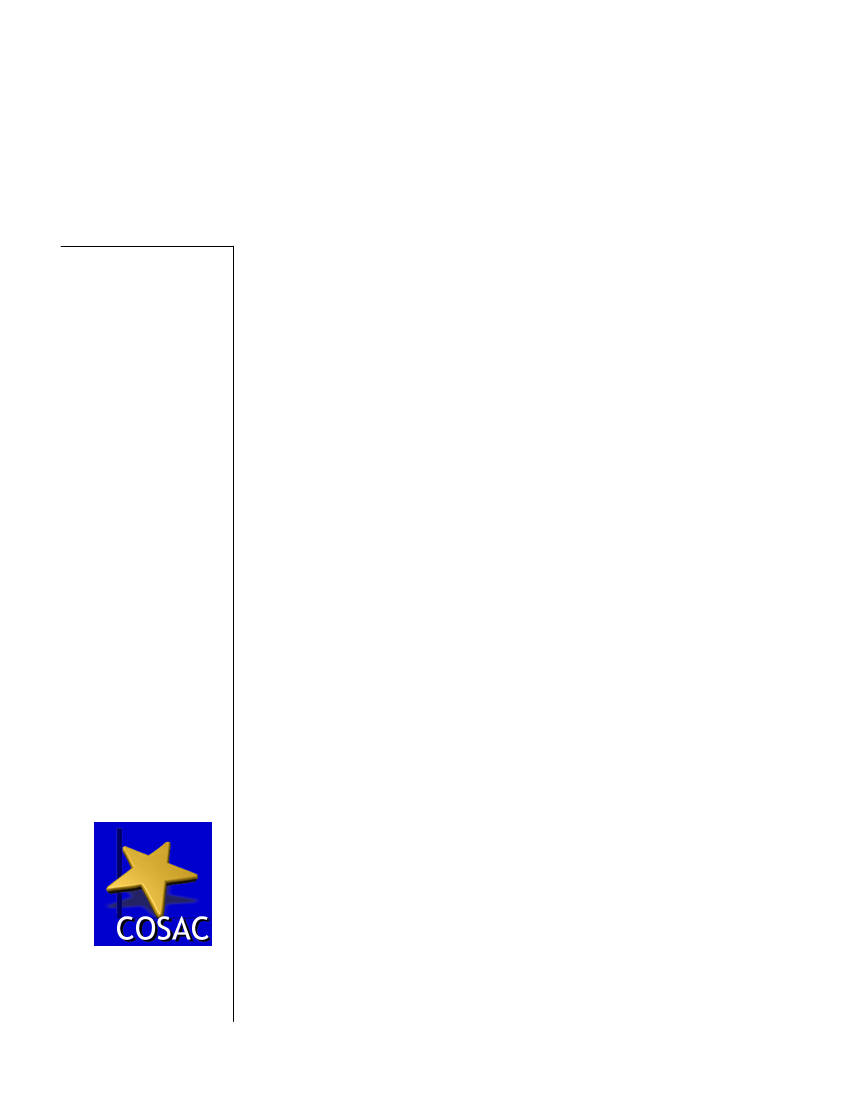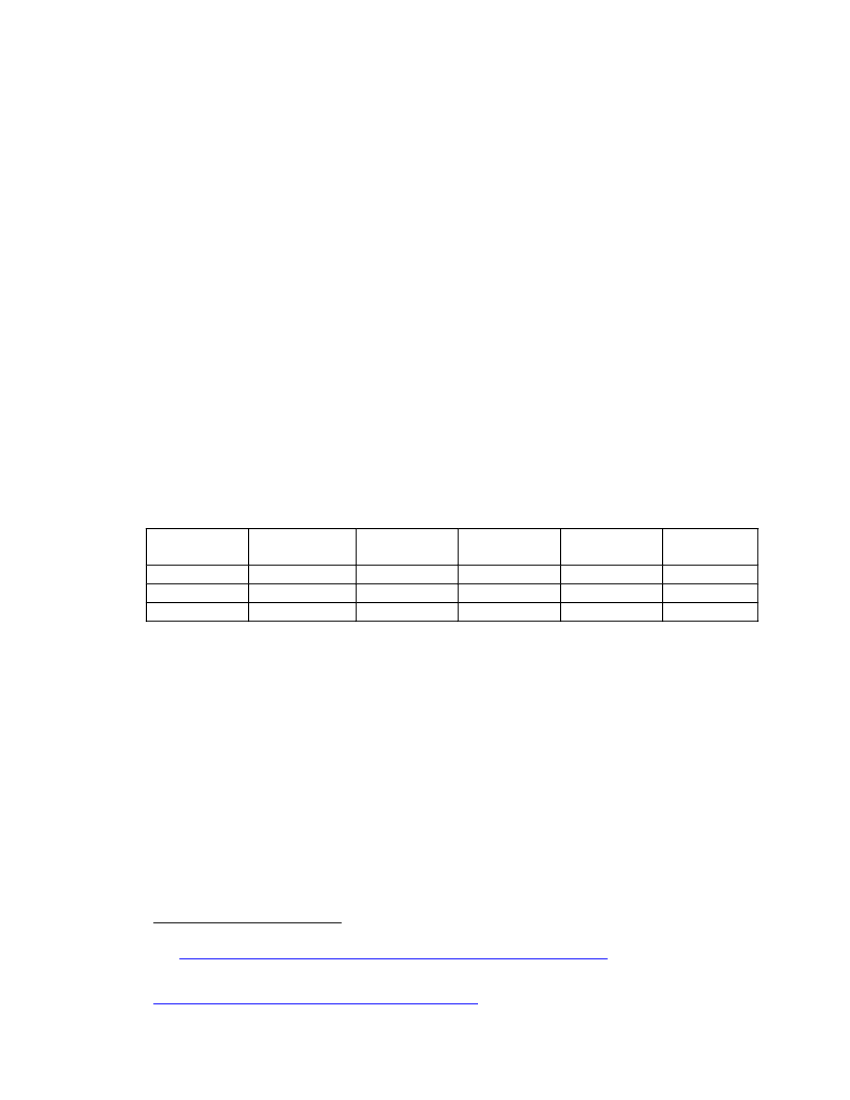Europaudvalget 2010-11 (1. samling)
EUU Alm.del Bilag 52
Offentligt
May 2010
Thirteenth Bi-annual Report:Developments in European UnionProcedures and PracticesRelevant to Parliamentary Scrutiny
Prepared by the COSAC Secretariat and presented to:XLIII Conference of Community and European AffairsCommittees of Parliaments of the European Union31 May - 1 June 2010Madrid
Conference of Community and European Affairs Committees of Parliamentsof the European Union
COSAC SECRETARIATWIE 05 U 041, 30-50 rue Wiertz, B-1000 Brussels, BelgiumE-mail:[email protected]| Fax: +32 2 284 4925
2
Table of ContentsBACKGROUND..................................................................................................................... 4ABSTRACT............................................................................................................................ 5CHAPTER 1: THE NEW POWERS OF NATIONAL PARLIAMENTS AFTER THE ENTRYINTO FORCE OF THE TREATY OF LISBON .................................................................... 111.1. REVIEW OF REGULATIONS ADOPTED................................................................ 111.1.1. Constitutional Provisions ..................................................................................... 121.1.2. Legal Provisions - Statutory Provisions ................................................................ 131.1.3. Parliamentary Standing Orders............................................................................. 141.1.4. Other.................................................................................................................... 151.2. THE NEW POWERS OF THE NATIONAL PARLIAMENTS IN THE EU DECISIONMAKING PROCESS ........................................................................................................ 161.2.1. Monitoring the Activities of the EU Institutions ................................................... 161.2.2. Ensuring Compliance with the Principle of Subsidiarity....................................... 201.2.3. Political Monitoring of Europol............................................................................ 241.2.4. Evaluation of Activities of Eurojust ..................................................................... 261.2.5. Participation in the Simplified Revision of the Treaties (Passarelle Clause) ......... 271.2.6. Actions for Annulment before the Court of Justice of the European Union onGrounds of a Breach of the Principle of Subsidiarity...................................................... 291.2.7. Applications for Accession to the European Union............................................... 291.2.8. Participation in the Interparliamentary Cooperation between National Parliamentsand with the European Parliament.................................................................................. 301.3. REPLIES OF THE EUROPEAN PARLIAMENT ...................................................... 31CHAPTER 2: THE FUTURE ROLE OF COSAC ................................................................. 312.1. CURRENT STRENGTHS AND WEAKNESSES OF COSAC................................... 322.1.1. Debate on the COSAC Agenda Topics Prior to COSAC Meetings ....................... 322.1.2. Debate on the COSAC Contribution and Conclusions .......................................... 332.1.3. The Effect of the Topics Debated at the COSAC Meetings and the COSACContribution and Conclusions........................................................................................ 342.1.4. Particularly Useful Aspects of COSAC Meetings ................................................. 352.1.5. Less Relevant Aspects of the COSAC Meetings................................................... 362.2. THE FUTURE ROLE OF COSAC ............................................................................. 372.2.1. Regular Items on the COSAC Agenda.................................................................. 372.2.2. Possibility of Adding Other Regular Items on the COSAC Agenda ...................... 402.2.3. Necessity to Provide More Time for Debates with the EU Institutions.................. 422.2.4. Debate on EU Draft Acts, Particularly EU Draft Legislative Acts ........................ 432.2.5. COSAC-coordinated Subsidiarity Checks ............................................................ 472.2.6. COSAC and Political Groups............................................................................... 502.2.7. Improvements Regarding the Existing Resources of COSAC ............................... 512.2.8. Composition of the Conference ............................................................................ 532.2.9. Acronym of the Conference ................................................................................. 542.2.10. Organisation of Interparliamentary Conferences................................................. 552.3. FUTURE PROCEDURE FOR COSAC MEETINGS.................................................. 582.3.1. The Format of COSAC Meetings ......................................................................... 582.3.2. Preferences Regarding the Number of Times each Parliament/Chamber can take theFloor on each Point on the Agenda ................................................................................ 592.3.3. Speaking Time Adjustments................................................................................. 61
3
BACKGROUNDThis is the Thirteenth Bi-annual Report from the COSAC Secretariat.
COSAC Bi-annual ReportsThe XXX COSAC decided that the COSAC Secretariat should producefactual Bi-annual Reports, to be published ahead of each ordinary meetingof the Conference. The purpose of the Reports is to give an overview of thedevelopments in procedures and practices in the European Union that arerelevant to parliamentary scrutiny.All the Bi-annual Reports are available on the COSAC website at:http://www.cosac.eu/en/documents/biannual/
The two chapters of this Bi-annual Report are based on information provided by nationalParliaments and the European Parliament.Each chapter begins with the relevant part of the outline adopted by the meeting of COSACChairpersons, held on 5 February 2010 in Madrid.As a general rule, the Report does not specify all Parliaments or Chambers whose case isrelevant for each point. Instead, illustrative examples, introduced in the text as “e.g.”, are used.The COSAC Secretariat is grateful to the contributing Parliaments for their cooperation.
Note on NumbersOf the 27 Member States of the European Union, 14 have a unicameralParliament and 13 have a bicameral Parliament. Due to this combination ofunicameral and bicameral systems, there are 40 national parliamentaryChambers in the 27 Member States of the European Union.Although they have bicameral systems, the national Parliaments of Austria,Ireland, Romania and Spain each submitted a single set of replies to thequestionnaire circulated by the COSAC Secretariat.The COSAC Secretariat received replies from 39 national Parliaments orChambers of 26 Member States and the European Parliament. These replies arepublished in a separate Annex to this Bi-annual Report which is also availableon the COSAC website at:http://www.cosac.eu/en/documents/biannual/
4
ABSTRACTCHAPTER 1: THE NEW POWERS OF NATIONAL PARLIAMENTS AFTER THEENTRY INTO FORCE OF THE TREATY OF LISBONAfter the entry into force of the Treaty of Lisbon on 1 December 2009, an overwhelmingmajority of Parliaments/Chambers has approved, or will approve in the near future, regulationsto adjust their national systems to the new Treaty. A few Parliaments/Chambers have notproceeded to these reforms yet, without nevertheless ruling out the possibility of doing so inthe near future.The Constitution has already been modified in France and Germany, while constitutionalreforms are expected to be initiated shortly in Slovakia and Austria.Legal provisions have already been adapted to the Treaty of Lisbon in fiveParliaments/Chambers, while nine of them have amended their Standing Orders. In both cases,the approach has been either broad, comprehending a broad range of changes derived from theTreaty of Lisbon; or more specific, focusing on particular issues. In this respect, specialattention has been paid to checks on EU draft legislative acts’ compliance with the principle ofsubsidiarity. Parliaments/Chambers that have not yet completed their reforms, both at thelegislative and the parliamentary levels, are expected to proceed with the necessaryamendments in the short or medium term.Finally, three Parliaments/Chambers have decided to adopt special procedures at committeelevel, by the corresponding Committees on EU Affairs, in order to check the compliance of EUdraft legislative acts with the principle of subsidiarity.Article 12 of the Treaty on European Union mentions the monitoring of EU institutions as amechanism through which national Parliaments participate in the good functioning of theEuropean Union. In addition, Protocol 1 on the role of national Parliaments in the EuropeanUnion as attached to the Treaty of Lisbon establishes the duty of the EU institutions to forwarda number of documents to national Parliaments. Each Parliament/Chamber has set up its ownmonitoring proceedings.As a general rule, Parliaments/Chambers monitor all types of activities and documentsforwarded by the EU institutions. Due to the high amount of consultation documents, draftlegislative acts and other documents, Parliaments/Chambers tend in general to focus onspecific types of documents, especially legislative proposals.The monitoring of the different activities and documents is usually comprehensive, althoughthey are usually selected according to criteria of national interest, relevance of the issues, oreven, the concerns of the regional entities represented in the Parliament/Chamber.The parliamentary bodies in charge of selecting documents and of the subsequent monitoringprocedure vary significantly in each Parliament/Chamber. They usually comprise theCommittee on EU Affairs. It is not uncommon for specialised committees to be involved aswell. The plenary may also have the final say in a number of proceedings.
5
In bicameral Parliaments, coordination and information exchange between both Chambers isensured either through a joint parliamentary body or through informal contacts.The Government is in almost all cases obliged to report to the Parliament/Chamber, either incompliance with the standard parliamentary rules or in compliance with a specific duty inrelation to EU related proceedings.The resources made available for the monitoring of EU matters vary considerably, as eachParliament/Chamber has its own unique administration. Most Parliaments/Chambersnevertheless pool their resources from the staff of the secretariat serving the Committee on EUAffairs or any other committee involved in the monitoring procedure. When there is no specificEuropean Union Unit within the structure of the Parliamentary administration, the InternationalRelations Department and the Library Service may also be involved.It is difficult to discern a general trend in the way Parliaments/Chambersensure thecompliance of EU draft legislative acts with the principle of subsidiarity.Indeed, the replies result in a multitude of different combinations ofactors and procedures.As far as the actors are concerned, in about half of Parliaments/Chambers the respectiveCommittees on EU Affairs play some role in the process. Regarding the level at whichdecisions are taken, it becomes clear that in about 65 % of Parliaments/Chambers the plenary isthe “decision maker” albeit that in a quarter of these cases the plenary considers and decidesonly if the subordinate actor(s) believe(s) that the considered draft legislative acts is in breachof the principle of subsidiarity.Regional parliamentsonly play a limited role in this process as they can take part in theformulation of an opinion in no more than a few Parliaments/Chambers.IPEXhas played a very important role in the COSAC-coordinated subsidiarity checks and anoverwhelming majority of Parliaments/Chambers expects its use to increase in the future. Thisdoes not mean that the Parliaments/Chambers turn a blind eye to IPEX’ shortcomings. As amatter of fact, the system’s limited user-friendliness, its (lack of) language policy and theabsence of a forum for unofficial information are the most frequently suggested improvements.Direct communication between Parliaments/Chambers and the EU institutionsis highlyvalued and, bearing this in mind, the suggestions to enhance the contacts with and the feedbackfrom the EU institutions and their members may not come as a surprise.Half of the respondents do not support the UK Government’s interpretation of the notion of“special legislative procedure” leading to a substantiallimitation of the matters falling underthe remit of subsidiarity checks,whereas about 20% do. The remainingParliaments/Chambers are still awaiting further information.In about two out of three Parliaments/Chambers, the Committee on EU Affairs plays some rolein thepolitical monitoring of Europol.Almost all the remaining Parliaments/Chambers replythat currently not to exercise any specific oversight on this institution. Regarding the oversightprocedures, a significant majority of the respondents states that they either do not have anyspecific procedures or that they apply, whenever necessary, their standard procedures.Moreover, this monitoring takes place without any specific criteria. Finally, only a limitednumber of regional parliaments intervene in the oversight of Europol.
6
Answers regarding theevaluation of the activities of Eurojustmay readily be consideredidentical to those regarding the political monitoring of Europol.Most Parliaments/Chambers have adopted rules regarding theirparticipation in theprocedures for simplified revisionof the Treaties (henceforth “passerelles”), although a largeminority have not yet done so. Several out of those who do have rules on this matter haveintroduced a provision to the effect that the respective Government may not support a proposalat the Council to use a “passerelle” clause unless it has the prior consent of theParliament/Chamber. Since this constitutes ana prioriveto, many of them have not consideredit necessary to introduce any particular procedures for a decisionex post.Others, where anopinions issued by the Parliament/Chamber before a decision is taken at the Council are notlegally binding upon the respective Government, have introduced procedures for taking adecision within the stipulated six-month period.Regardless of whether a Parliament/Chamber deals with the matter before or after a decision atthe Council (or both), it is, with few exceptions, the plenary that decides on the basis of areport drafted by the Committee on EU Affairs. However, other relevant committees are ormay be involved, depending on the nature of the proposal.In almost all bicameral Parliaments, the Chambers decide independently, i.e. no formalprocedure for reaching a joint position is needed. The involvement of regional parliaments isprescribed in a few Member States with a federal structure, at least in cases where the matteraffects issues on which the regional parliaments are competent to decide.As regardsactions for the annulmentbefore the Court of Justice of the European Unionongrounds of breach of the subsidiarity principle,less than half of the Parliaments/Chambershave as yet adopted procedures for such action. Of those that have, it is in almost all cases theplenary of the Parliament/Chamber that would take the final decision. The plenary usuallydecides on the basis of an initiative and report submitted by the Committee on EU Affairs,although in this case a significant number of Parliaments/Chambers would instead decide onthe basis of a report by the committee responsible for the specific issue. Most answers indicatethat the Government cannot reject a request issued by its Parliament (or by one of theChambers, when they have the competence to issue such a request separately) to take actionbefore the Court of Justice of the European Union.Concerning notifications onapplications for membership of the Union,it appears that thisnew provision in the Treaties does not have many practical consequences in nationalParliaments/Chambers, as accession treaties must, in any case, be approved by them beforebeing ratified by the respective Member State. Many Parliaments/Chambers have thepossibility of influencing their Government's position in membership negotiations. When anaccession Treaty is put before the Parliament/Chamber it is usually the Committee on EUAffairs that produces a report for the plenary to decide upon, although the Committee onForeign Affairs is often involved and in some cases is the lead committee.Only in a couple of answers is it indicated that the European Parliament Resolution on thedevelopment of relations between the European Parliament and National Parliaments under theTreaty of Lisbon has been specifically debated at a national Parliament/Chamber, and in nocase has a resolution or similar document been adopted (except, obviously, at the EuropeanParliament itself). However, some respondents mention that the Resolution, or issues coveredin it, has been debated in a broader context. Similarly, no Parliament/Chamber has held a
7
debate specifically on the implementation of Article 9 of the Protocol on the role of nationalParliaments in the European Union, but some point out that matters related to futureinterparliamentary cooperation within the EU has been debated. A few answers make referenceto the ongoing discussions in the framework of the EU Speakers' Conference in this regard.CHAPTER 2: THE FUTURE ROLE OF COSACThetopics on the COSAC agendaare not formally debated at most Parliaments/Chambers orby their Committees on EU Affairs. However, in most cases, the agenda is transmitted to themembers of the Committee on EU Affairs, to the COSAC delegation and in some cases tospecialised committees responsible for the subject-matter. Hardly any Parliaments/Chambershave regular procedures for preparing topics on the COSAC agenda, but most of them have anad hocprocedure to inform Members and more specifically the members of their COSACdelegation.After COSAC meetings, a vast majority of Parliaments/Chambers hold no debate on the resultsof the meeting. In most cases, the conclusions/contribution, sometimes accompanied by areport on the meeting, are transmitted to the members of the Committee on EU Affairs and insome cases to other bodies of the Parliament/Chamber.In most cases, topics debated at COSAC meetings and COSAC conclusions/contribution dohave an effect on the work of Parliaments/Chambers. In some cases this results in bringingforward certain issues to be addressed by the Parliament/Chamber, in other cases, it provides areference for issues under discussion. Generally, a large number of Parliaments/Chambersconsider the debates at COSAC and the conclusions/contribution a useful source ofinformation and best practice.When asked about useful and less useful aspects of COSAC meetings, practically allParliaments/Chambers highlighted more useful aspects then less relevant ones. The usefulaspects mentioned most include the exchange of information and best practice, the COSAC-coordinated subsidiarity checks and the exchange of views with Members of the EUinstitutions, especially the European Commission and the Council of the European Union.A number of Parliaments/Chambers do not identify any less relevant aspects of the COSACmeetings. However, some Parliaments/Chambers do mention such less useful aspects asgeneral debates on non-legislative topics, on Bi-annual Reports, on the priorities of thePresidency, on technical and procedural issues.Analysis of the replies regardingregular items on the COSAC agendahas revealed that avast majority of Parliaments/Chambers expresses support for debates on COSAC Contributionand Conclusions, COSAC Bi-annual Reports, on the principle of subsidiarity, the Presidencyprogramme and on the European Commission's Annual Policy Strategy or similar document.The remaining Parliaments/Chambers do not wish to keep these as regular items on the agenda.A sizeable majority of Parliaments/Chambers consider it possible to add debates on the area offreedom, security and justice; on political monitoring of Europol and evaluation of Eurojust'sactivities; and on the European Commission's Annual Work and Legislative Programme asregular items on the COSAC agenda. A slightly smaller, but still large, majority expresses thesame opinion as regards common foreign and security policy, including common security and
8
defence policy. The remaining Parliaments/Chambers, about one forth of the total, take theopposite standpoint.As to the time allocated forfuture COSAC debates with the European Commission,morethan a half of Parliaments/Chambers have indicated that additional time would be very useful,while the same number of Parliaments/Chambers prefer not to extend the current timingarrangement with regard to debates withthe Council.Concerning the question of whether Parliaments/Chambers agree on COSACdebatingspecific EU draft acts,an overwhelming majority is in favour, although in most cases withcertain reservations. Parliaments/Chambers often point out that such debates should take placein the framework of subsidiarity checks, or on a case by case basis. The majority considers thattheselection of proposals for debateby COSAC should be made by the Presidency, incooperation with the COSAC Presidential Troika and/or by national Parliaments. If eventuallysuch debates are held, about half of Parliaments/Chambers are in favour ofbasing them on apart of a COSAC Bi-Annual Report.A vast majority is in favour ofparticipation in thedebates of a Member of the European Commission, the European Parliamentrapporteurand the Chairpersons of the competent committees at national Parliaments.Approximately half the Parliaments/Chambers support the idea of the Members of Parliamentwho work on the subject joining their COSAC delegation, pointing out that it is a matter foreach Parliament to decide. Concerning the issue of whether elements found during suchdebates should form a part of the Contribution of COSAC, an overwhelming majority is infavour. However, some Parliaments/Chambers add that it depends on the issue and/or onwhether consensus is reached.Withreference to EU draft acts that could eventually be debatedat the forthcomingordinary meetings of COSAC, a vast majority has not submitted any proposals, mainly due tothe fact that the European Commission's Work Programme for 2010 had not been published atthe time of submitting their replies to the questionnaire on which this Report is based.There is no clear consensus on the continuation of the coordinated COSAC subsidiaritychecks.A large majority of Parliaments/Chambers neither favours devoting more time todeliberationwithin political groups(European political families) during the ordinary meetings of COSACnor holding political group meetings during the meetings of COSAC Chairpersons.An analysis of the replies to the question onpossible improvements to the existing resourcesof COSAC,especially the COSAC Secretariat, shows that a vast majority ofParliaments/Chambers is satisfied with the current state of affairs or has no comments on thematter. Specific suggestions regarding improvements to the existing resources available toCOSAC mostly relate to COSAC’s cooperation with the EU Speakers’ Conference, theCOSAC Bi-annual Reports, its website, the preparation of COSAC agendas and the COSACSecretariat staff.In view ofArticle 10 of the Protocol on the role of national Parliaments in the EuropeanUnionas attached to the Treaty of Lisbon, which provides for the possibility for theConference of Parliamentary Committees for Union Affairs, inter alia, to “promote theexchange of information and best practice between national Parliaments and the EuropeanParliament, including theirspecial committees”and to “organiseinterparliamentary
9
conferenceson specific topics”, the analysis shows that an overwhelming majority ofParliaments/Chambers sees no need to modify the current composition of COSAC.As regards the currentacronym of the Conference 'COSAC',a large majority ofParliaments/Chambers has expressed their support for keeping it unchanged.Apart from a few general observations, mostly related to the future role of COSAC,Parliaments/Chambers are almost unanimous in their opinion thatthe current format ofCOSAC meetings is functioning welland therefore it is not necessary to change it.In regard tothe number of timeseach Parliament/Chambercan take the floor on each pointon the COSAC agenda,there is difference of opinions:the majority of Parliaments/Chambers state that it should not be limited;the majority of Parliaments/Chambers expresses the opinion that the number of timeseach Parliament/Chamber can take the floor on each point on the agenda should not belimited to once nor twice per Parliament/Chamber;for a sizeable group of Parliaments/Chambers, the number of times each Parliament /Chamber can take the floor on each point on the agenda should not be limited butsecond or third-time uses of the floor should only be granted after all nationalParliaments have had their chance to speak; andmost of the Parliaments/Chambers consider that concerning the number of times eachParliament/Chamber can take the floor on each point on the agenda, the Chairpersonmay adopt any one of these procedures based on the number of requests for the floor.Some Parliaments/Chambers have made a number of suggestions, such as division andprioritization of the requests for taking the floor in questions and comments, coordinationbetween delegations so as to ensure that both majority and the opposition will be heard,limitation on the number of agenda items etc.For the majority of Parliaments/Chambersspeaking time should be limited to between 2 and3 minutesin order to ensure that the largest number of Parliaments/Chambers can take thefloor.
10
CHAPTER 1: THE NEW POWERS OF NATIONAL PARLIAMENTSAFTER THE ENTRY INTO FORCE OF THE TREATY OF LISBONOn 1st December 2009, the Treaty of Lisbon entered into force, introducing amendments to theTreaty on European Union and the Treaty establishing the European Community, which willhenceforth be known as the Treaty on the Functioning of the European Union. In the amendedTreaty on European Union, the new Article 12 acknowledges the role of national Parliamentsin the European Union, listing a number of mechanisms through which national Parliamentsare to “contributeactively to the good functioning of the Union”.Further provisions of theTreaty on European Union (henceforth “TEU”) and the Treaty on the Functioning of theEuropean Union (henceforth “TFEU”), as well as of the first two Protocols to the Treaty ofLisbon, specify the scope of national Parliaments’ participation in the European Union’sdecision-making processes.These new mechanisms1are:Receipt of information and draft legislative acts from the EU institutions;Ensuring compliance with the principle of subsidiarity;Taking part in the evaluation mechanisms for the implementation of Unionpolicies in the area of freedom, security and justice;Involvement in the political monitoring of Europol and the evaluation of activitiesof Eurojust;Taking part in the revision procedures of the Treaties;The participation in the request for filing an action for annulment before the Courtof Justice of the European Union (henceforth “the Court of Justice”) on groundsof a breach of the principle of subsidiarity;Receipt of notifications of applications for accession to the European Union;Participation in the interparliamentary cooperation between national Parliamentsand with the European Parliament.The first chapter of the Bi-annual Report concentrates on how these new mechanisms are beingincorporated into the regulations and everyday procedures of the national Parliaments. Due tothe limited time since the entry into force of the Treaty, the chapter focuses on the regulationsthat have been passed or are foreseen to be adopted in the near future.After listing the new regulation, the chapter focuses on the different aspects (parliamentarybodies involved, procedures, effects, criteria, etc.) of these mechanisms as they areimplemented in each national Parliament.1.1. REVIEW OF REGULATIONS ADOPTEDGiven the relevance of the new powers entrusted to national Parliaments by the Treaty ofLisbon, the vast majority of Member States (i.e. 35) have approved, since its entry into forceon 1 December 2009, or will approve in the near future, different types of regulations to adjusttheir legal systems to the new Treaty.1
These mechanisms are described in detail in the Ninth COSAC Bi-annual Report (The Treaty of Lisbon -implementation and its consequences for the national Parliaments of the EU, May 2008).
11
However, a few Parliaments/Chambers (i.e. 5) have not yet proceeded to these reforms. This isthe case of the HungarianOrszággyűlés,as it reports that “the existing constitutional and legalprovisions enable the Hungarian National Assembly to exercise most of the powers granted byArticle 12 of the TEU”. In the LatvianSaeima,any regulation has been modified and it wasagreed, in a meeting of chairpersons, deputy chairpersons of all the standing committees andheads of the parliamentary groups held on 3 December 2009 that “theSaeimaRules ofProcedure need not to be amended”. Finally, no reform of the regulations is deemed necessaryat theVouli Ton Antiprosoponof Cyprus and the LithuanianSeimas.Nevertheless, all theseParliaments/Chambers do not rule out the possibility of adopting future regulations concerningthe new powers of national Parliaments in the EU. In the HungarianOrszággyűlés,thispossibility might be taken into consideration by the new Assembly due to be convened in May2010, while in the LithuanianSeimas,“relevant amendments will be drafted in a generalpackage at a later stage in order to achieve optimal implementation of the new provisions”.Since the entry into force of the Treaty of Lisbon, several Parliaments/Chambers2(i.e. 9) reportthat they have concluded all the reforms required under their legal systems in order to adaptthem to the new system enshrined in the Treaty of Lisbon.Due to the limited time since the entry into force of the Treaty, many national Parliaments (i.e.15) have not yet completed the reforms required by the Treaty of Lisbon. Nevertheless, theyplan, in the short or medium term, to approve specific regulations to conclude their adaptationto the Treaty of Lisbon.1.1.1. Constitutional ProvisionsThe Constitution has only been modified, in order to implement the Treaty of Lisbon, in Franceand Germany.The GermanBundestagandBundesratmodified the following articles of the German BasicLaw: Article 23 (with the aim of “enshrining the right of theBundestagand theBundesrattoinitiate proceedings before the Court of Justice in cases of non-compliance with the principleof subsidiarity”), and Articles 45 and 93 (which contain the “details of procedure within theBundestag”)3.In France, the Constitution was adapted to new powers accorded by the Treaty of Lisbon tonational Parliaments in 2008, before the ratification of the Treaty was completed, with theintroduction of two new Articles, 88-6 and 88-7. Article 88-6 deals with the check on thecompliance of EU draft legislative acts with the principle of subsidiarity and the possibility ofbringing an action before the Court of Justice; while Article 88-7 focuses on the “rightsaccorded to national Parliaments regarding the use of “passerelle clauses” to initiate asimplified revision of the Treaties, and judicial cooperation in civil matters”4.Only two of the national Parliaments have reported they intend to amend the Constitution, inorder to adjust it to the provisions of the Treaty of Lisbon. The SlovakNárodná radawill2
The CzechPoslanecká sněmovnaandSenát,the FinnishEduskunta,the FrenchAssembléenationale, theGermanBundesrat,the HellenicVouli ton Ellinon,the DutchEersteand theTweede Kamer,the SwedishRiksdag,the SlovenianDržavni zborand the UKHouse of Lords.3The complete text of the mentioned Articles of the German Basic Law is included in the Annex to this Report.4The text of the mentioned Articles of the French Constitution is included in the Annex to this Report.
12
initiate, in the short or medium term, the amendment of Constitutional Act 397/2004, on thecooperation between theNárodná radaof the Slovak Republic and the Government of theSlovak Republic in matters concerning the European Union. In Austria, both theBundesratandtheNationalrat,are currently considering a draft accompanying law to the Treaty of Lisbon,“Lissabon Begleitnovelle”,which is intended to be passed within the next two or three months.The bill concerns “several changes to the Austrian Federal Constitutional Law, aiming atgiving Parliament’s two chambers the instruments to make use of the new competences of theTreaty of Lisbon”.The reforms accomplished regarding theRiksdag Actof the Swedish Parliament, which is semiconstitutional and has thus to be reformed either following the constitutional revisionprocedures or through a special procedure involving a qualified majority5, will be mentioned insub-section 1.1.3 on Parliamentary Standing Orders.1.1.2. Legal Provisions - Statutory ProvisionsMost Member States have not yet enacted specific legal provisions in order to adapt theirsystems to the Treaty of Lisbon. Only national Parliaments of a limited number of MemberStates (i.e. 5) have done so: the GermanBundestagandBundesrat,the SpanishCortesGenerales,the IrishHouses of the Oireachtas,the DutchEerste andtheTweede Kamerand theUKHouse of CommonsandHouse of Lords6.The scope of these legal provisions is ample in the case of Spain, where after the entry intoforce of the Treaty of Lisbon, Act 24/2009 was enacted in order to regulate the new powers oftheCortes Generales;and in the case of Ireland, where the European Union Act was passed inOctober 2009 to give legal effect to the enhanced powers of theHouses of the Oireachtas.Thisapproach was also adopted by the United Kingdom, where the Treaty of Lisbon wasincorporated into national law by an Act of Parliament, the “European Union (Amendment)Act 2008”, which received Royal Assent on 19 June 2008. The Act gives the Treaty of Lisbonprimacy over national law and lays down procedures for parliamentary approval of theordinary and simplified revision procedures.A more specific legal reform was carried out in Germany, where in June 2009 the GermanBundestagandBundesrat,as a result of the German Constitutional Court’s ruling on the Treatyof Lisbon, revised the “Act on Cooperation between the Federal Government and the GermanBundestag in Matters concerning the European Union”, and enacted the “Act on the Exerciseby the Bundestag and by the Bundesrat of their Responsibility for Integration in Mattersconcerning the European Union (Responsibility for Integration Act)”. A very specific reformwas accomplished in the Dutch Parliament, where the Approval Bill of the Treaty of Lisboncodified the right to enforce a parliamentary reserve in the Council regarding new EU draftlegislative acts.Several Parliaments/Chambers (i.e. 6) are planning to amend some of their legal provisions, orto enact new laws, in order to complete their adaptation to the new system after the entry intoforce of the Treaty of Lisbon: the BelgianChambre des répresentantsandSénat;the Italian
5
The constitutional reform provisions in the Swedish legal system are foreseen in the SwedishInstrument ofGovernment,Chapter 8, Articles 15 and 16.6The texts of the mentioned Laws are included in the Annex to this Report.
13
Camera dei Deputati;the PolishSejmand theSenat;the PortugueseAssembleia da Repúblicaand theParlamentul României.At the BelgianChambre des représentants,two bills are presently in the pipeline. The firstone, will allow the seven Belgian parliamentary Assemblies “to conclude an agreement on howto execute the subsidiarity procedure”, which is currently being renegotiated in the light of theTreaty of Lisbon; while the second one will allow theConseil d´Étatto be “asked for advicewith regard to the distribution of internal competences in a federal State regarding thelegislative proposals of the EU”.In the case of the ItalianCamera dei Deputati,four bills have been submitted, containingprovisions for implementing some of the new powers, notably, “early warning mechanism,action for annulment before the Court of Justice for breach of the principle of subsidiarity, vetoto general bridging clause and bridging clause in Family Law area”. Also, a bill is expected tobe submitted by the Government regarding these issues. Furthermore, the Draft AnnualCommunity Act of 2009, now in its third reading by theCamera dei Deputati,contains “aspecific provision concerning the information the Government must provide to the Chambersfor the exercise of the subsidiarity check”.The same approach has been adopted by theParlamentul României,where five drafts are beingprepared, including all the necessary adaptations of the Romanian legal system to the Treaty ofLisbon. One of these drafts refers to a legal provision, the Law on Cooperation of theParliament and the Government in European Affairs.The PolishSejm,through its Subcommittee of the EU Affairs Committee, is giving course to adraft text amending the current Act of 11 March 2004 on the Cooperation of theSejmandSenatwith the Government on EU Matters. This draft refers to all the new powers granted bythe Treaty of Lisbon to national Parliaments. The PolishSenatreports that a bill on thecooperation of the Council of Ministers with theSejmand theSenatin matters related toPoland’s membership of the EU is due to replace the Cooperation Act of 11 March 2004.In Portugal, even though the Constitution of the Portuguese Republic and the Law no. 43/2006on Monitoring, assessment and pronouncement on the process of construction of the EuropeanUnion provide theAssembleia da Repúblicawith the necessary legal basis to put into practicethe Treaty of Lisbon, an amendment to Law No. 43/2006 could be foreseen in the near future,“to enshrine some of the mechanisms introduced by the Treaty of Lisbon and to take up newprocedures”.1.1.3. Parliamentary Standing OrdersA certain number of Parliaments/Chambers7(i.e. 9) have already revised their Rules ofProcedure, Standing Orders,Estatutes, Reglamentos,etc. (henceforth “Standing Orders”) inorder to adapt them to the new powers that are entrusted to national Parliaments by the Treatyof Lisbon.
7
The BelgianChambre des représentants,the CzechPoslanecká sněmovna,the FinnishEduskunta,the FrenchAssemblée nationale,the HellenicVouli ton Ellinon,the DutchEerste Kamerand theTweede Kamer,the SwedishRiksdagand the UKHouse of Lords.
14
The scope of the revisions of these parliamentary regulations is either broad, as in the cases ofthe DutchStaten-Generaal,the UKHouse of Lordsand the SwedishRiksdag;or narrowed tospecific reforms, as in the cases of the Belgian Chambers and the Hellenic Parliament.Amongst the broader revisions of Parliaments/Chambers’ internal regulations, in the DutchTweede Kamer,during the 2009-2010 parliamentary year, a new procedure was adopted on theEuropean policy and legislative process, including “comprehensive guidelines for the scrutinyof European legislative proposals”. This Chamber has also recently adopted procedures for theuse of a parliamentary reserve in relation to the Government's position before the Council. TheDutchEerste Kamerhas developed the previously mentioned “Approval Bill of the Treaty ofLisbon”, into specific rules of procedure. At the same time, this Chamber had alreadyestablished a special Subsidiarity Check Committee. The UKHouse of Lordsagreed ProcedureCommittee 2nd and 3rd Report 2009-2010, on 16 March 2010, to adjust their Standing Ordersto the new system enshrined in the Treaty of Lisbon. In the SwedishRiksdag,two amendmentshave been added to theRiksdag Act,which is semi-constitutional: firstly, new procedures withregard to checking the compliance with the principle of subsidiarity of new legislative acts;secondly, treaty amendments were also dealt with.Amongst the more specific revisions of Standing Orders, some had been intended to implementthe subsidiarity procedure, as was the case in the BelgianChambre des représentants,inArticle 37 bis of the Standing Orders of the House. The same aim inspired the FrenchAssemblée nationalereform of its Rules of Procedure on 27 May 2009, after the institutionalreform accomplished in 2008. New Articles 151-9 to 151-11 of this text refer to the proceduresfor verifying the principle of subsidiarity. In other cases, as for instance the HellenicVouli tonEllinon,the revision of the Standing Orders aimed to create a new structure within theparliamentary administration. The General Directorate for Foreign Affairs and Communicationnow comprises “the competent units for interparliamentary cooperation and for support ofparliamentary committees when monitoring the EU institutions or scrutinizing Europeanlegislation”.Parliamentary regulations are expected to be revised, in the short or medium term, in severalParliaments/Chambers (i.e. 12)8. The revision of the Rules of Procedure of the GermanBundestagwill concern “competences/responsibilities of the EU Committee and specialisedcommittees for coordination in subsidiarity objections and proceedings”. TheParlamentulRomânieifaces the amendments of the Standing Orders of theCamera Deputaţilor,theStanding Orders of theSenatul,the Rules of Procedure of the Committee on European Affairsand the Rules of Procedure of theParlamentul Românieifor the subsidiarity control.1.1.4. OtherGiven the relevance of the scrutiny of EU initiatives by national Parliaments, some of thereforms accomplished by the Parliaments/Chambers relate in particular to this topic. In thisrespect, in Portugal, according to the existing legal basis (the Portuguese Constitution and Lawno. 43/2006) the Committee on European Affairs approved a new procedure for scrutiny of EUinitiatives on 20 January 2010. In Denmark, theFolketingCommittee on European Affairs and8
The BelgianSénat,the CypriotVouli Ton Antiprosopon,the EstonianRiigikogu,the FrenchSénat,the GermanBundestag,the IrishHouses of the Oireachtas,the ItalianSenato della Republica,the LuxembourgChambre desDeputés,the PolishSenat,theParlamentul României,the SpanishCortes Generalesand the UKHouse ofCommons.
15
the Government reached an agreement on how to monitor the principle of subsidiarity on 26March 2010. In the Austrian Parliament, the parliamentary practice established during thesubsidiarity tests is intended to be followed on a provisional basis for the transitional period.A broader approach was adopted by the IrishHouses of the Oireachtas,whose JointCommittees on European Scrutiny and European Affairs agreed on a joint report on“Implementation of the Lisbon Treaty: Interim arrangements on the enhanced role of theHouses of the Oireachtas”,on 8 December 2009. On 10 December 2009, both Houses of theOireachtaspassed a Resolution which implemented the recommendations of the report andprovided for the implementation of Section 7 of the European Union Act 2009 (Role ofHousesof the Oireachtas).1.2. THE NEW POWERS OF THE NATIONAL PARLIAMENTS IN THE EUDECISION MAKING PROCESSThe following questions focus on each of the different mechanisms through which the nationalParliaments are called to participate in the EU framework. The questions relate to the mainelements of the proceedings whereby, according to the national regulations that have beenpassed or that are foreseen to be adopted soon, will implement in each national Parliament themechanisms established in the Treaties.1.2.1. Monitoring the Activities of the EU InstitutionsThe first mechanism through which national Parliaments contribute actively to the goodfunctioning of the Union, according to Article 12 of the Treaty on European Union is by “beinginformed by the institutions of the Union and having draft legislative acts of the Unionforwarded to them in accordance with the protocol on the role of national parliaments in theEuropean Union”(henceforth “Protocol 1”).Furthermore, Protocol 1 establishes that the European Commission (henceforth “theCommission”) consultation documents, its annual legislative programme as well as any otherinstrument of legislative planning or policy (Article 1), draft legislative acts (Article 2), theagendas and outcomes of meetings of the Council, including the minutes of meetings where theCouncil is deliberating on draft legislative acts (Article 5) initiatives of the European Councilwhen it intends to make use of the first or second subparagraphs of Article 48(7) (Article 6)and the annual report of the Court of Auditors (Article 7) shall all be forwarded by thecompetent EU institutions to national Parliaments. These provisions allow national Parliamentto monitor the activities of the EU institutions, which are implemented in very different waysin each Member State.In order to facilitate the comparison between the different procedures for monitoring, thisReport will focus on the following items: (1) the different activities that are monitored; (2) theselection process of monitored activities; (3) the parliamentary bodies involved in the selectionprocess; (4) the Government’s role in the monitoring procedure; and (5) the resources at thedisposal of each Parliament/Chamber for this purpose.Monitored ActivitiesAs a general rule, most Parliaments/Chambers monitor all types of activities and documentsforwarded to them by the EU institutions.16
As an exception to this general rule, the BelgianSénatonly monitors three EU institutions: theCommission, the Council and the Court of Justice; while the LuxembourgChambre desDeputéslimits its monitoring to the Commission and certain documents submitted by theCouncil. The UKHouse of Commonsexpressly excludes the Council and the EuropeanCouncil conclusions, and the GermanBundesratdoes not monitor activities regarding commonforeign and security policy.Nevertheless, and due to the amount of communications, proposals and documents forwardedby the different EU institutions, Parliaments/Chambers tend in general to focus on specifictypes of documents, especially draft legislative acts. This is the case of the FrenchSénat,theHungarianOrszággyűlés,the SlovakianNárodná rada,the CzechPoslanecká sněmovnaandthe DutchEerste Kamer.Furthermore, in this respect it must be said that the followingparliaments/Chambers use the Commission’s Legislative and Work Programme to pinpointtheir priorities: the LatvianSaeima,the SlovakianNárodná rada,the LithuanianSeimas,theHellenicVouli ton Ellinon,the PortugueseAssembleia da República,the PolishSenatand theDutchEerste Kamer.The HungarianOrszággyűlésalso focuses on the position of itsGovernment in different formations of the Council concerning given legislative proposals.The BelgianChambre des représentantsfocuses on documents from the Commission, theCouncil and the European Council, while the DutchTweede Kamerfocuses on Councilmeetings and Commission proposals. In the DanishFolketing,in practise most interest isconcentrated on the “agenda of the Council, plus the work of the Commission, the EuropeanParliament and the Court of Justice”.Selection of DocumentsMonitoring of the different activities and documents is usually comprehensive, although anumber of criteria are used to select the initiatives that the Parliament/Chamber wishes to givea certain priority to. The criteria for the prioritisation are as follows:(i)National interest,for example in the case in the BulgarianNarodno Sabranie,theVouli Ton Antiprosoponof Cyprus, the HungarianOrszággyűlés,the IrishHousesof the Oireachtas,the LuxembourgChambre des Deputés,the PolishSenat,theParlamentul Românieiand the BelgianSénat;(ii)Relevance of the issues,as mentioned, for instance, by the LithuanianSeimas,theDanishFolketingand the UKHouse of Lords,which expressly mentions that the“national interest” is not necessarily a deciding factor for selection;(iii)The interest of theLänder,as established by the GermanBundesrat.The parliamentary body that is entitled to select the documents that are to be monitored,according to the above mentioned criteria, does vary in each Parliament/Chamber:(i)The Committee on EU Affairsat the HellenicVouli ton Ellinon,the FrenchAssemblée nationale,the PolishSejm,the PortugueseAssembleia da República,theCzechSénat,the SlovakianNárodná rada,the LatvianSaeimaand the SlovenianDržavni zbor,the UKHouse of Commons;(ii)Competent specialised committeesdraw up their lists of priorities in a significantnumber of Parliaments/Chambers, as the PortugueseAssembleia da Repúblicainthe “enhanced” monitoring procedure, the DutchEerste Kamerand the BulgarianNarodno Sabranie;
17
(iii)(iv)(v)(vi)(vii)(viii)(ix)(x)
The Committee on EU Affairs and the Foreign Affairs Committeeat theLithuanianSeimasand the CzechSenát;The European Unitwithin the International Relations Department at theLuxembourgChambre des Deputés;The Bureau and the Spokespersons of the Joint Committee on EU Affairsat theSpanishCortes Generales,on the proposals of the parliamentary groups;The Chairperson of the European Affairs Committeeof the UKHouse of Lordsor the Chairperson of theSénat’sdelegation to the Federal Advisory Committee onEuropean Affairs in the case of the BelgianSénat;The leaders of the political groups together with the Chairpersons ofCommitteesat the SlovenianDržavni svet;The Speakerof the PolishSenát;The EU Affairs Departmentat the BelgianChambre des représentants;The officers of the EU Affairs Service and Members of Parliamentmay identifythe relevant proposals at theVouli Ton Antiprosoponof Cyprus.
The case of Denmark stands out in this point, as it is the Government's responsibility to filterthe Commission’s proposals and decide which matters fall within the category of “majorsignificance” or “considerable importance”, in order to be scrutinised by theFolketingEuropean Affairs Committee.Parliamentary Bodies Involved in the Monitoring ProcedureOnce the relevant documents have been selected, the Committee on EU Affairs is usually incharge of the monitoring procedure.In some Parliaments/Chambers, the competent specialised committees may also have animportant role to play:(i)In a number of cases, thespecialised committeeshave the exclusive mandate formonitoring the activities of the EU institutions, as in the BelgianSénatand theChambre des représentants,the FrenchAssemblée nationale,the GermanBundestag,the DutchEerste Kamerand the SlovakianNárodná rada.(ii)In other cases, the opinion of the specialised committees may be sought by theCommittee on EU Affairs.This is the case of the AustrianNationalratand theBundesrat,the DanishFolketing,the PortugueseAssembleia da Repúblicain the“normal” monitoring process, the CzechPoslanecká sněmovnaand theSenátandthe PolishSenat.(iii)In a number of parliamentary systems, although the Committee on EU Affairs playsthe leading role,the specialised committees may also participatein theprocedure, either together with the lead Committee on EU Affairs or instead of thelead committee. This is the case of the FrenchSénat,the HellenicVouli ton Ellinon,the ItalianSenato della Repubblicaand theCamera dei Deputati,the LuxembourgChambre des Deputés,the SlovenianDržavni svet,the IrishHouses of theOireachtas,the PortugueseAssembleia da Repúblicain the case of the “enhanced”monitoring process, the SwedishRiksdagand the HungarianOrszággyűlés.(iv)In the case of the UKHouse of Commons,the documents are examined either by aSubcommittee of the Committee on EU Affairs or by the European Committeeitself.The plenary of the Parliament/Chamber is also involved in the monitoring procedure:
18
(i)
(ii)(iii)
On an optional basis,the FrenchSénatand theAssemblée nationale,the BelgianChambre des représentants,the PolishSenat,the SlovenianDržavni svet,the DutchEerste Kamer,the CzechPoslanecká sněmovnaand theSenát,the UKHouse ofCommonsand both Chambers of the SpanishCortes Generales;On a mandatory basis,unless otherwise stated, an opinion must be adopted by theplenary of the GermanBundesratand the BelgianSénat;The final decision regarding certain issues is to be adopted bythe plenaryof bothChambers of theParlamentul României.
In bicameral Parliaments, coordination and information exchange between both Chambers maybe provided through a variety of mechanisms:(i)Through a Joint Committeein charge of monitoring with Members of bothChambers, as it is the case with the SpanishCortes Generales,the IrishHouses ofthe Oireachtasand theParlamentul României.In the case of the BelgianParliament, the Federal Advisory Committee is a joint body that also provides asimilar coordination mechanism, although in an advisory capacity.(ii)Through a common administrationfor both Chambers, as is the case of theAustrian Parliament.(iii)Through informal contactsbetween the relevant committees at political andadministrative levels, as is the case of the UK, Czech, German, Italian andSlovenian Parliaments. In the case of the Dutch Parliament, the specialisedcommittees coordinate informally. In the case of the Czech Parliament, theConstitution allows for the creation of a joint parliamentary body.The Chambers of the Polish Parliament do not exchange information, formally or informally.The Role of the Government in the Monitoring ProcedureDuring the monitoring procedure, the relevant regulation usually provides for a specific duty ofthe Government to report to the Parliament/Chamber.In some cases, there is no specific regulation regarding the Government's duty to report, andtherefore the general regulations regarding the relations between the Government and theParliament apply. This is the case of the BelgianSénatandChambre des représentants,theFrenchAssemblée nationaleand the HellenicVouli ton Ellinon.In the UKHouse of Lords,although there is no obligation to report, the Government has thepractice of forwarding memoranda and statements before and after each Council meeting.Some regulations do not establish the duty to report. This is the case of the FrenchSénat,theSlovenianDržavni svetand theVouli Ton Antiprosoponof Cyprus. The absence of anobligation to report is due, in the Cypriot case, to the presidential nature of their system ofGovernment, although the Executive is always willing to be represented at parliamentarycommittee meetings.Available ResourcesAmong the resources available for monitoring, most Parliaments/Chambers mention the staffon the secretariat of the Committee on EU Affairs, which in the case of the Belgian Chambersis the Federal Advisory Committee on European Affairs. In the case of the LithuanianSeimas
19
and the SlovenianDržavni zbor,the staff of the Committee on Foreign Affairs is also takeninto consideration, as this committee also deals with EU issues.Furthermore, a number of Parliaments/Chambers also take into account the staff at thesecretariats of the specialised committees which may deal with EU issues related to theirspecific terms of mandate. This is the case of the BelgianChambre des représentantsand theSénat,the DutchEerste Kamer,the LuxembourgChambre des Deputés,the PortugueseAssembleia da Repúblicaand the SwedishRiksdag.Some Parliamentary administrations also have a specific European Unit, with a variety ofnames: the task force for the analysis of EU documents of the BelgianChambre desreprésentants,the European Law Department of the BulgarianNarodno Sabranie,theEuropean Affairs Officers of theVouli Ton Antiprosoponof Cyprus, the EU Unit of theParliamentary Institute of the Czech Parliament, the EU-advisory Unit in the DanishFolketing,the Europe Division of the GermanBundestag,the Department for relations with the EU of theItalianCamera dei Deputati,the European Unit within the International Relations Directorateof the LuxembourgChambre des Deputés,the EU Unit of the PolishSenát,the EuropeanAffairs Directorate of the RomanianSenatul,the European Union Department of the HellenicVouli ton Ellinonand the EU Coordination Unit of the SwedishRiksdag.In the SpanishCortes Generalesand the HungarianOrszággyűlés,the Foreign AffairsDepartment also pools resources for certain activities concerning the monitoring of EUactivities.The Library Services as well as the Research facilities are also made available for this purposein the case of the SpanishCortes Generalesand the IrishHouses of the Oireachtas.The UKHouse of Commons,the IrishHouses of the Oireachtasand the SlovenianDržavni zborand theDržavni svetalso mention the legal Counsel or legal advisor. A large number ofParliaments/Chambers also include their representatives in Brussels as part of the availablestaff that may be involved in the monitoring proceedings.1.2.2. Ensuring Compliance with the Principle of SubsidiarityOut of the 39 Parliaments/Chambers that reply to the question regardingthe parliamentarybodies in charge of ensuring compliance with the principle of subsidiarity,5 have not yetspecified the actors which will eventually be in charge. (i.e. the AustrianNationalratand theBundesrat,the FrenchSénatand the SpanishCortes Generales).From the analysis of the remaining 34 replies, which results in no less than 21 differentcombinations of actors involved, it is difficult to discern a general trend.This situation becomes clearer, however, when the participation of the Committee on EUAffairs in those 34 Parliaments/Chambers is taken into account. Indeed:in 19 of them, the Committee on EU Affairs scrutinizes the principle of subsidiarity incombination with one or several specialised committees and (optionally) with theplenary. At the CzechPoslanecká sněmovna,for instance, the Committee on EuropeanAffairs may pass draft acts of the European Union to other specialised committees or tothe plenary whereas at the CzechSenátthe resolutions of the Committee on EU Affairshave to be confirmed by the plenary;
20
on 8 more occasions, the Committee on EU Affairs is the only committee of theParliament/Chamber concerned, albeit that in 4 of these (the IrishHouses of theOireachtasand the UKHouse of Lordsand theHouse of Commons),the plenaryalways participates whereas in another 3 (the HungarianOrszággyülès,the ItalianCameradei Diputatiand the PolishSejm)the plenary is only an optional co-actor. Thisleaves the LatvianSaeimaas the only Parliament where this committee “bears the soleresponsibility for assessing the compliance of new EU legislation with the principles ofsubsidiarity and proportionality”; andin 7 Parliaments/Chambers, the Committee on EU Affairs plays no role in this matter.
Out of the 39 Parliaments/Chambers having answered the question onthe proceduresinvolved,6 have not yet taken a decision regarding the specific procedures to be followed (i.e.the AustrianNationalratand theBundesrat,the FrenchSénat,the SlovakianNárodná rada,theSlovenianDržavni zborand the EstonianRiigikogu).The analysis of the remaining 33 cases reveals no less than 27 different procedures by whichthe compliance with the principle of subsidiarity is ensured, making it very difficult toconclude on a general trend. Yet, the number of these procedures can be narrowed downconsiderably by taking into account the level at which the decision is made.In doing so, the number of Parliaments/Chambers in which the plenary plays a role isoverwhelming. Indeed:13 Parliaments/Chambers (e.g. the DutchTweede Kamer,where the “draft opinion isendorsed by the plenary” and the Finnish Eduskunta, where the “final decision is madein the plenary by a simple majority vote”) report that every subsidiarity procedure isconcluded by a decision in the plenary regardless if a subordinate level believes there isa breach of the subsidiarity principle or not;in 7 other cases (e.g. in the PolishSenatwhich, if the specialised committee or theCommittee on EU Affairs states that the draft in question does not comply with theprinciple of subsidiarity, “might submit a reasoned opinion to the EU institutions” andthe LithuanianSeimas,where “upon deciding that the proposal to adopt a legal act ofthe European Union may not be in conformity with the principle of subsidiarity, theconclusions of the Committee on European Affairs or the Committee on ForeignAffairs are referred for debate in theSeimasplenary”) the plenary only steps in when asubordinate level believes that a draft legislative act is in breach of the subsidiarityprinciple; andin 5 more cases the plenary acts on an optional basis (e.g. in the SpanishCortesGeneraleswhere “if the plenary of either Chamber decides to recall the final vote, thereasoned opinion of the Joint Committee will be debated and put to a vote in bothPlenaries” and in the BelgianChambre des représentantswhere a specialisedcommittee may call in the plenary whenever this is deemed necessary.In 5 Parliaments/Chambers (i.e. the BulgarianNarodno Sabranie,the CypriotVouli tonAntiprosopon,the ItalianCamera dei Deputati,the LatvianSaeimaand the DanishFolketing)the decision on a subsidiarity issue is taken by the Committees on EU Affairs although, in thecase of theVouli ton Antiprosopon,the executive and interested parties are also invited toparticipate.
21
This leaves 3 Parliaments/Chambers (i.e. the ItalianSenato della Repubblica,the GreekVouliton Ellinonand the PortugueseAssembleia da República)with “particular” procedures. Fordetails on these procedures, we refer to the Annex to this Report.The question onthe participation of regional parliamentsis answered by 15Parliaments/Chambers. In 4 of those (the AustrianBundesrat,the ItalianCamera dei Deputati,the PortugueseAssembleia da Repúblicaand the UKHouse of Lords)the regional parliamentsare consulted by the federal Parliaments/Chambers: the AustrianBundesratwill even beobliged to inform all theLandtageon the draft legislative acts whereas the ItalianCamera deiDeputatiand the PortugueseAssembleia da República,will only do so when necessary and theUKHouse of Lordsintends to “contact them informally” where it thinks it appropriate.In 4 more Parliaments/Chambers (the ItalianSenato della Repubblica,the SpanishCortesGeneralesand the UKHouse of Commons)the opinions sent to them by the regionalparliaments are examined. In the case of theCortes Generales,these opinions will not bebinding, but if their Joint EU Committee “approves a reasoned opinion on the same draft act,the list of opinions of the regional parliaments will be attached to theCortes’opinion, togetherwith the relevant references to facilitate their consultation”. The UKHouse of Commonsstatesthat its European Scrutiny Committee “should place the onus on the regional parliaments toobtain draft EU legislation, vet it and tell the ESC as quickly as possible if they haveobjections”.In 3 cases (the BelgianChambre des représentantsand theSénatand the GermanBundesrat)the regional parliaments can actively take part in the formulation of the opinion if the matterunder consideration falls within their remits. The remaining 4 Parliaments/Chambers (theDutchTweede Kamer,the IrishHouses of the Oireachtasand the FinnishEduskunta)reportrather singular procedures which can be consulted in the Annex.Out of the 35 Parliaments/Chambers which answer the question on the use they made ofIPEXduring the COSAC-coordinated subsidiarity checks:33 state that they used this tool on these occasions. Several amongst them even declarehaving made use of it outside the framework of these checks;2 Parliaments/Chambers (the FinnishEduskuntaand the UKHouse of Lords)mentionnot having used the IPEX platform very extensively. Indeed, the former finds IPEX“not immediately useful for subsidiarity matters” and the latter considers it “often a lesshelpful experience than we would wish”.Of the 26 national Parliaments/Chambers having replied to the question onthe future use ofIPEX,25 believe it will increase although only very few provide any explanation as to thereasons why they think so. Amongst those that do explain their opinion, the PolishSejmexpects the use of IPEX to increase “due to conducted subsidiarity checks”, the LithuanianSeimasstates that “considering the fact that with the enforcement of the Treaty of Lisbon thesignificance of exchange of information between parliaments is increasing” and the EstonianRiigikoguis of the opinion that “the frequency of the usage will depend on content andlanguage, needs and availability of other resources”. Only the UKHouse of Commonsforeseesno change.The following outline holds the most frequently advanced suggestions onpossibleimprovements to IPEXin order to support real-time information exchange betweenParliaments:
22
the system’suser-friendliness(e.g. its limited speed, the number of manipulationsrequired, etc.) should be increased (10 Parliaments/Chambers);a forum for unofficial informationought to be developed (9 Parliaments/Chambers);there ought to be afirm language policy(9 Parliaments/Chambers). In this context, theDutchEerste Kamerspeaks for courtesy translations in English or French, the FrenchAssemblée nationaleand the GreekVouli ton Ellinonwant the documents to beavailable in English or French, the PortugueseAssembleia da Repúblicawould like asummary in English or French stating the related procedure and final result of thescrutiny on EU proposals and the UKHouse of Commonsand theHouse of Lordswantthe data to be uploaded “ina commonly understandable language”;a specificsectionshould be foreseen forsubsidiarity issues(6 Parliaments/Chambers);data are to beuploaded timely and correctly(5 Parliaments/Chambers);summariesof the EU documents and of the Parliaments’ reactions to them should beprovided (4 Parliaments/Chambers).
An overwhelming majority of the Parliaments/Chambers (i.e. 30 out of the 31 having answeredthis question) plans itsforthcoming communication with the EU institutionsthrough theexisting channels such as the representatives based in Brussels (e.g. the UKHouse ofCommonsand theHouse of Lordsand the PortugueseAssembleia da República),the so-calledBarroso initiative (e.g. the BelgianChambre des représentantsand the PortugueseAssembleiada República),thematic meetings with delegates from the EU institutions (e.g. theParlamentulRomâniei).Only the FinnishEduskunta“does not see direct interaction with the EUinstitutions as particularly desirable” as, “normally, it instructs the government to negotiate onbehalf of the Republic of Finland”.The most frequently suggestedimprovement of the communication with the EU institutions(mentioned by 11 out of the 15 Parliaments/Chambers having suggested any) concernsenhanced (personal) contacts with and feedback from the EU institutions and their members.Of these Parliaments/Chambers 4 (i.e. the BulgarianNarodno Sabranie,the IrishHouses of theOireachtasand the FrenchAssemblée nationale)suggest videoconferences as the toolparexcellenceto that end. Other, more specific suggestions are:enhancing the contacts with the respective COREPER (the GreekVouli ton Ellinon);developing the political contacts with other national Parliaments (the PortugueseAssembleia da República);a special e-mail-link for documents from the EU Court of Auditors (the LatvianSaeima).Out of the 35 Parliaments/Chambers having replied to thequestion raised by the UK Houseof Commons regarding a possible limitation of the new powers given to nationalParliamentsunder Protocol 1 and Protocol 2 on the application of the principles ofsubsidiarity and proportionality (henceforth “Protocol 2”) of the Treaty of Lisbon, as outlinedin the Note circulated at the Madrid COSAC Chairpersons' meeting18 Parliaments/Chambers are of the opinion that the definition of a “special legislativeprocedure” and therefore a “legal act” under Article 2899of TFEUdoes not limit their
Article 289 TFEU:“1.The ordinary legislative procedure shall consist in the joint adoption by the European Parliament and theCouncil of a regulation, directive or decision on a proposal from the Commission. This procedure is defined inArticle 294.
23
new powers.Amongst those, the AustrianNationalratand theBundesratare of theopinion that “according to the opinion of the legal service of the Austrian ForeignAffairs Ministry the evolution of Art. 289 leaves no space for a loophole”, the BelgianChambre des représentantsstates that “a political reflex should prevail over a purelylegislative approach”, the CypriotVouli ton Antiprosoponwrites that “a broaderinterpretation should be given to the definition of “legal act” so that the new powersgiven to national Parliaments are not limited”, theParlamentul Românieidoes not sharethe concerns expressed by the delegation of the European Scrutiny Committee of theUKHouse of Commonsas it thinks that “the Treaty provisions on draft legislative actssubject to full (including the possibility to issue a reasoned opinion) subsidiaritycontrol, according to Article 2, Protocol 1 and Article 3, Protocol 2, are clear”, theSlovenianDržavni zborbelieves that “the legal nature of an act will be judgedaccording to its content and its legal consequences, not its form” and the SpanishCortes Generalesreason that “only draft legislative acts are to be the object of reasonedopinions regarding the compliance with the principle of subsidiarity. Non legislativeacts, as defined by the Treaties, are therefore not meant to be the object of the saidprocedure”;11 Parliaments/Chambershave not yet reached a final opinionon the matter: someare still awaiting further information either from their own departments (e.g. the DutchEerste Kamerwhich has referred the matter to the Dutch Ministry of Foreign Affairs)or from the EU institutions (e.g. the IrishHouses of the Oireachtas)or they have notyet addressed the matter (e.g. the SwedishRiksdag)or they have not yet reached anofficial position (e.g. the HungarianOrszággyülès);6 Parliaments/Chambers (the DutchTweede Kamer,the FinnishEduskunta),stating that“the powers of national parliaments in ensuring compliance with the principle ofsubsidiarity concern only proposals within the “normal legislative procedure” regulatedin Article 289.1.”, the LatvianSaeima,the SlovakianNárodná rada,the UKHouse ofLordsand the DanishFolketing)agree with the UK Government’s point of view.Out of the 22 Parliaments/Chambers having replied, 16 did not seek theirGovernment’s viewon this matterwhereas the AustrianNationalratandBundesrat,the DutchEerste Kamer,theFinnishEduskunta,the LithuanianSeimasand the UKHouse of Lordsdeclare havingconsulted their Governments before reaching their conclusions.1.2.3. Political Monitoring of EuropolIn 11 of the 38 Parliaments/Chambers which answer the question regardingthe parliamentarybodies in charge,there is no specific political monitoring of Europol (e.g. in the BelgianSénat,the FrenchAssemblée nationaleand theSénat,the ItalianCamera dei Deputatiand theSlovakianNárodná rada)as in most cases this monitoring occurs in the framework of thestanding procedures regarding the scrutiny of EU proposals.
2. In the specific cases provided for by the Treaties, the adoption of a regulation, directive or decision by theEuropean Parliament with the participation of the Council, or by the latter with the participation of the EuropeanParliament, shall constitute a special legislative procedure.3. Legal acts adopted by legislative procedure shall constitute legislative acts.4. In the specific cases provided for by the Treaties, legislative acts may be adopted on the initiative of a group ofMember States or of the European Parliament, on a recommendation from the European Central Bank or at therequest of the Court of Justice or the European Investment Bank”.
24
In 23 Parliaments/Chambers, the Committee on EU Affairs takes part in the monitoring ofEuropol:in 13 of these, this happens in combination with specialised committees (e.g. in theHungarianOrszággyülès);in 8 more cases, not only one or more specialised committees but also the plenary playsa role. This is the case, for example, in the AustrianNationalratand theBundesratwhere the respective Committees on Home Affairs and the plenary are competent andin the PortugueseAssembleia da Repúblicawhere this task falls within the remits of theCommittee on Constitutional Affairs, Rights, Freedoms and Guarantees and theplenary;in 2 Parliaments/Chambers (the CzechSenátand the LatvianSaeima)the Committeeon EU Affairs is the sole actor.In the 4 remaining Parliaments/Chambers, i.e. the BelgianChambre des représentants,theDutchTweede Kamer,the GermanBundestagand the LuxembourgChambre des Députés,theCommittee on EU Affairs does not take part in the monitoring of Europol. In the BelgianChambre des représentants,this task is carried out by the competent specialised committeetogether with the plenary, in the GermanBundestagby the Committee on Internal Affairs andthe plenary and in the DutchTweede Kameronly by the Standing Committee on Justice andthe Committee on EU Affairs.Out of the 39 Parliaments/Chambers that answer the question onthe procedures involved,19and the European Parliament state that they do not have a systematic procedure to monitorEuropol and 8 (e.g. the BelgianChambre des représentantsand the BulgarianNarodnoSabranie)claim to use the standing parliamentary oversight tools already at their disposal.In 5 cases (the FrenchAssemblée nationale,the GermanBundestagand theBundesratand theParlamentul României),decisions are made at the level of the plenary, in combination with theCommittee on EU Affairs and/or any of the specialised committees.In 4 more Parliaments/Chambers, this procedure only involves the Committee on EU Affairsand one or more specialised committees (such as the Committees on Security and onConstitutional and Legal Affairs at the CzechPoslanecká sněmovna,the Committee on Justiceat the SwedishRiksdag,the Defence, Internal Affairs and Corruption Prevention Committee atthe LatvianSaeimaand the Committees on Legal Affairs and on National Security andDefence at the LithuanianSeimas).Moreover, at the LatvianSaeima,“once a year arepresentative from Latvia to Europol is invited to attend the joint meeting of the EuropeanAffairs Committee and the Defence, Internal Affairs and Corruption Prevention Committeeduring which the annual report of Europol is presented” and the LithuanianSeimasis entitledto invite the national representatives from Europol and responsible persons from executivebodies they are subordinate to, and to make inquiries to them.In 2 Parliaments/Chambers (i.e. the CzechSenátand the PolishSejm)the Committee on EUAffairs is solely responsible for the political monitoring of Europol. Moreover, the CzechSenátreports that “discussions with Czech liaison officers at Europol to inquire on current Europoltopics take place before the Committee on EU Affairs on an irregular basis”. Finally, theDanishFolketingstates that “due to Denmark’s opt-out on JHA the Government only presentsthe above mentioned proposals to the European Affairs Committee for information”.
25
The question regardingthe participation of regional parliamentsonly applies to 3 out of the39 Parliaments/Chambers having answered it as either there are no regional parliaments or thepolitical monitoring of Europol does not fall within their remits. In this context, the PortugueseAssembleia da Repúblicaand the AustrianBundesratstate that their respective regionalparliaments are consulted whenever they are competent for the matter at hand. The GermanBundesratanswers that the “Landtage (parliaments of the federal states) <are involved> in thedecision-making process in keeping with Land-specific procedures”.The 33 national Parliaments/Chambers that reply to the question regardingthe possiblespecific criteria regarding the exercise of the political monitoring of Europolunanimouslystate that their regulations do not provide any such criteria.1.2.4. Evaluation of Activities of EurojustAt 14 of the 39 Parliaments/Chambers that answer the question onthe parliamentary bodiesin chargeof exercising such evaluation, there is no specific evaluation of Eurojust.In 21 other Parliaments/Chambers, the Committee on EU Affairs takes part in the evaluation ofEurojust:at 11 of which this happens in combination with a specialised committee;in 8 more cases, this combination is extended by the plenary; andat 2 Parliaments/Chambers (i.e. the CzechSenátand the LatvianSaeima)theCommittee on EU Affairs is the sole actor.At the 4 remaining national Parliaments/Chambers (i.e. the BelgianChambre desreprésentants,the DutchTweede Kamer,the GermanBundestagand the LuxembourgChambre des Députés),the Committee on EU Affairs does not take part in the monitoring ofEurojust. In theChambre des représentants,this task is carried out by the competentspecialised committee together with the plenary, in the GermanBundestagby the Committeeon Legal Affairs and the plenary.Out of the 39 Parliaments/Chambers having replied to the question regardingthe proceduresinvolved,18 state not having a systematic procedure to evaluate Eurojust and 10 claim to usethe standing parliamentary oversight tools already at their disposal.In 5 other Parliaments/Chambers (the FrenchAssemblée nationale,the GermanBundestagandtheBundesratand theParlamentul României),decisions are made at the level of the plenary, incombination with the Committee on EU Affairs and/or any of the specialised committees.In 4 more Parliaments/Chambers, this procedure only involves the Committee on EU Affairsand one or more specialised committees (such as the Committees on Security and onConstitutional and Legal Affairs at the CzechPoslanecká sněmovna,the Committee on Justiceat the SwedishRiksdag,the Defence, Internal Affairs and Corruption Prevention Committee atthe LatvianSaeimaand the Committee on Legal Affairs at the LithuanianSeimas).At the CzechSenátthe Committee on EU Affairs is solely responsible for the evaluation ofactivities of Eurojust. Moreover, this Chamber reports that already for the third time, hearingsof the Czech Member of Eurojust are held by the Committee on EU Affairs. Finally, theDanishFolketingstates that “due to Denmark’s opt-out at JHA the Government only presentsthe above mentioned proposals to the European Affairs Committee for information”.26
The question onthe participation of regional parliamentsonly applies to 2 out of the 39Parliaments/Chambers having replied to it as either there are no regional parliaments or theevaluation of Eurojust does not fall within their remits. The PortugueseAssembleia daRepúblicastates that the regional parliaments are consulted whenever they are competent forthe matter at hand and the GermanBundesratanswers that the “Landtage (parliaments of thefederal states) <are involved> in the decision-making process in keeping with Land-specificprocedures”.The 34 national Parliaments/Chambers that answer the question regardingthe possible specificcriteria regarding the exercise of the evaluation of Eurojustunanimously state that theirregulations do not provide any specific criteria regarding the exercise of the evaluation ofEurojust.1.2.5. Participation in the Simplified Revision of the Treaties (Passarelle Clause)A majority of the EU Parliaments/Chambers have regulations in place, specifying how theywill act in connection with their participation in the “Simplified revision procedures”.However, there are many of them that have not yet defined the modalities for theirparticipation in such procedures.Some of those that have regulations note that there is a difference between revisions based onArticle 48.6 of the TEU, compared to Article 48.7 of the TEU. In the former case theamendment shall not enter into force “until it is approved by the Member States in accordancewith their respective constitutional requirements”, i.e. the procedure from a Parliament’s pointof view does not differ from an ordinary revision of the Treaties. The procedure foreseen inArticle 48.7, on the other hand, normally requires a Parliament/Chamber to take an initiative ofits own, in case it opposes a decision to be taken by the European Council.Therefore, some Parliaments/Chambers (e.g. the FinnishEduskuntaand the IrishHouses of theOireachtas)state that they have special procedures only for revisions based on Article 48.7,while cases based on Article 48.6 would be dealt with in the same manner as for instance an“ordinary revision”, or any other international agreement requiring ratification.In several Member States, the Government is not authorized to accept a decision in the Councilconcerning a “simplified revision” unless it has the prior consent of the Parliament to do so(e.g. the AustrianNationalratand theBundesrat,the DanishFolketing,the LatvianSaeima,theSlovakianNárodná Rada,theUK House of Commonsand theHouse of Lords).Where prior consent is required, some have not considered it necessary to provide for anyparticular proceduresex post,i.e. after a decision on the use of “simplified revision” has beentaken by the Council. Others, in particular where the mandate is politically rather than legallybinding (e.g. the PolishSenat,the SwedishRiksdag)also have, or foresee, procedures wherebya final decision can be taken by the Parliament/Chamber within the six months limit providedfor in the Treaties. Such procedures are generally foreseen or put in place in Member Stateswhere Governments can act at the Council without a mandate from their Parliament (e.g. in theIrishHouses of the Oireachtas,the SlovenianDržavni zborand theDržavni svet,the SpanishCortes Generales).
27
Most bicameral Parliaments (e.g. the Belgian, Czech and Irish and UK Parliaments) indicatethat both Chambers separately have the right to “veto” an amendment by “simplified revision”.In France and Spain, on the contrary, unless both Chambers oppose an initiative, it isconsidered that the Parliament does not oppose it. In some other bicameral Parliaments (e.g.the Parliament of Slovenia) the role of the upper Chamber is advisory, meaning that if the twoChambers are of different opinions it is the opinion of the lower Chamber that prevails.Therefore, in none of these cases the Parliaments have any need for rules on how to establish ajoint position. However, in the Irish, Dutch, and Spanish Parliaments the two Chambers have ajoint Committee for EU Affairs, giving the same recommendation to both Chambers. This ineffect constitutes a mechanism to at least promote a joint position, although the Chambersformally decide independently of each other. Only in the case of the Romanian Parliament -which also has a Joint European Affairs Committee - does the answer indicate that a decisionon the use of a “passerelle” would be taken in a joint session of theCamera DeputaţilorandtheSenatul.Regardless of which provisions apply, the parliamentary bodies involved are usually theCommittee on EU Affairs and the plenary/-ies. In many Parliaments/Chambers, (e.g. theFinnishEduskunta,the FrenchAssemblée nationale,theParlamentul României)the relevantspecialised committee(s) are also involved, depending on the nature of the proposedamendment. (In the particular case of a revision on the basis of Article 81 of the TEU theCommittee responsible for Civil Law is mentioned.) In almost all cases where the respectiveanswer clarifies this point, it is the Committee on EU Affairs that is the lead committee, theonly exception being the SwedishRiksdag,where it is the specialized committee responsiblefor the matter the revision concerns.A notification of a decision under Article 48.7 would, as indicated above, be dealt with by oneor more committees. In case the responsible committee opposes the decision, it submits areport to the Parliament/Chamber(s) recommending the adoption of a resolution or a similardecision to that effect, to be forwarded to the President of the European Council. If, on theother hand, the committee does not oppose the revision proposed, the plenary would not, inmost cases, take any decision on the matter.However, in a few Parliaments/Chambers not only committees can make proposals fordecisions in plenary. In the SpanishCortes Generalesone or two party groups or a fifth of theMembers of any of the two Chambers can also do so. In the EstonianRiigikoguthe politicalgroups also have that right. In the UKHouse of Commonsand theHouse of Lordsnoinvolvement of a committee is obligatory, although committees may submit a report for theinformation of Members before a vote. Instead, a Government minister would move a motionfor the respective House to approve the Government's intention to support the draft Councildecision.The involvement of regional parliaments is prescribed in a few Member States with a federalstructure (such as Austria and Belgium) at least in case the matter affects issues on which theregional parliaments are competent to decide. In the case of Belgium each one of the regionalparliaments/assemblies – in addition to the Chambers of the national Parliament – has the rightto “veto” a revision. In other cases (the PortugueseAssembleia da República)regionalparliaments/assemblies shall be consulted, or have the right to present their opinions, while thefinal decision is taken solely by the national Parliament in question.
28
1.2.6. Actions for Annulment before the Court of Justice of the European Union onGrounds of a Breach of the Principle of SubsidiarityMore than half of the respondents state that procedures are under discussion, not yet decidedupon, etc. A few of these can, based on their constitutional principles or draft acts, give anindication of what might reasonably be expected. Nevertheless, it is difficult to draw generalconclusions from the answers concerning what type of procedures Parliaments/Chambers willbe using for initiating actions for annulment.In all but two cases where procedures are put in place, a decision to take action for annulmentcan be taken only by the Parliament/Chamber as such. The FrenchAssemblée nationaleas wellas theSénat,mention that that the French Constitution foresees, as an alternative, that if aninitiative for action is supported by a minimum of sixty Members of theAssemblée nationaleor sixty Senators, it would be submitted to the Government on behalf of the respectiveChamber. The other exception is theChambre des Deputésof Luxemburg, where, if no plenaryis held within the time limit given, the decision to submit the initiative can be taken by theConference of Presidents.A decision to take such an action would be taken on the basis of an initiative and report by acommittee – sometimes the committee responsible for the specific issue (e.g. the AustrianNationalrat,the LuxemburgChambre des Deputés,the SwedishRiksdag),but more often bythe Committee on EU Affairs (e.g. the DanishFolketing,the IrishHouses of the Oireachtas,the LithuanianSeimas,the PolishSenat,the SpanishCongreso de los DiputadosandSenado).Similarly to the situation as regards use of a “passerelle”, in some cases (e.g. the CzechPoslanecká sněmovnaand theSenat,the SpanishCongreso de los Diputadosand theSenado)acertain number of Members can also submit a proposal to the plenary, and in the UKHouse ofLordsan individual Member may move a motion for such a decision by the House.A few answers mention that the Government shall have the possibility – or obligation – topresent its view when a draft decision to take action for annulment is debated. Presumably, inmost cases the Government’s general point of view is informally known anyway, since it willhave participated in the decision-making in the Council concerning the legislative act inquestion.In most answers (e.g. the AustrianNationalrat,the CzechPoslanecká sněmovnaand theSenát,the IrishHouses of the Oireachtas,the PolishSejm and the Senat)it is indicated that theGovernment can not reject a request to take action, if such a request is issued by its Parliament(or by one of the Chambers, when they have the competence to issue such a requestseparately). In other cases (e.g. the DutchEerste Kamerand theTweede Kamer,the SpanishCortes Generales,the SwedishRiksdag)a request by Parliament would be politically bindingon the Government. However, there is ultimately no other “sanction” available to Parliamentthan a vote of no confidence in case the Government should refuse to take action.1.2.7. Applications for Accession to the European UnionThe Treaty of Lisbon lays down that national Parliaments shall be notified of applications foraccession to the Union. Although some respondents indicate that the matter is currently beingdiscussed, it appears that most Parliaments/Chambers have not considered it necessary tointroduce any major changes in their rules as a consequence of this provision. In practice, thecorresponding information has been provided earlier, often by Governments on the basis of a29
general duty to inform Parliament about important matters related to the EU. Therefore the newTreaty does notper senecessitate any change of procedures.The parliamentary bodies involved are usually the Committee(s) on EU Affairs and theplenary/-ies. In many cases (e.g. the CzechPoslanecká sněmovnaand theSenát,the CypriotVouli ton Antiprosopron,the LithuanianSeimas)the Committee on Foreign Affairs is alsoinvolved. Specialised committees may be involved in an advisory capacity. In a fewParliaments/Chambers (e.g. the BelgianChambre des représentantsand theSénat,the SwedishRiksdag)the plenary decides on the basis of a report by the Committee on Foreign Affairs, i.e.the Committee on EU Affairs does not have any formal role in the Parliament’s decision onapproval of an accession treaty (but may follow the negotiations). Similarly, in the case of theAustrianNationalratand theBundesrat,it is usually their Committees on ConstitutionalAffairs that submit the reports to the plenary.The FrenchAssemblée nationalepoints out that the Constitution of France was amended in2008, so that in principle the decision to ratify an accession treaty should be taken byreferendum. However, if both Chambers decide by a majority of three fifths of their respectiveMembers, the matter can instead be decided by a qualified majority at theCongrès,comprisingall Members of the two Chambers.The Committee(s) involved, as well as the plenary/-ies, often have the possibility to passresolutions during the course of negotiations, or to voice their opinions less formally indiscussions with the Government. Those that can “instruct” or “mandate” their Government onhow to act in the Council (e.g. the FinnishEduskunta)can generally give binding instructionsalso in the case of membership negotiations – by resolutions or otherwise – while in othercases (e.g. the DutchEerste Kamerand theTweede Kamer)the Government takes resolutionsetc. into account as they find appropriate. In the latter cases, a Government that does not paysufficient attention to the express opinion of a Parliament/Chamber can ultimately risk a voteof no confidence. Apparently this follows the general pattern of how EU affairs are handled inthe respective Member States, except that in the case of accession treaties it is the Parliamentsthat have the final say.Accession treaties constitute, as is pointed out in some answers, a change of EU Primary Law,and Member States are therefore required to ratify them “in accordance with their respectiveconstitutional requirements”, which in this case means that the new Treaty must be approvedby the respective Parliaments. Parliaments/Chambers then follow their standard procedures forthe “ordinary revision procedure” of the Treaties.1.2.8. Participation in the Interparliamentary Cooperation between National Parliamentsand with the European ParliamentIn none of the responses is it indicated that a national Parliament/Chamber has debated orexamined the Resolution of the European Parliament on the development of relations betweenthe European Parliament and National Parliaments under the Treaty of Lisbon (the “Brokreport”) at the plenary level, or that any resolution concerning it has been adopted. However, afew answers indicate that the respective Committee on EU Affairs has given some attention tothe report. In one case (the CzechPoslanecká sněmovna)the Committee on European Affairshas debated it, on the occasion of a visit by Mr. Brok. Also the Committee on European Affairsof the LatvianSaeimahas examined the report. Others mention that the issues covered by thereport have been discussed in a broader context (the GermanBundestag,the PolishSenat),that
30
it has been distributed to Members of the Committee on EU Affairs (the BulgarianNarodnoSabranie,the IrishHouses of the Oireachtas,the LithuanianSeimas,the PolishSejm),or thatMembers are aware of the report, have been briefed about it, etc.As is pointed out by the GermanBundestag,one or more of the major points mentioned in thereport – such as inviting the Members of the European Parliament representing the respectivecountries to participate in meetings of their Committees on EU Affairs – is already part of thepractice in some national Parliaments.Similarly, no Parliament/Chamber has specifically debated the implementation of Article 9 ofProtocol 1. Some mention, however, that issues related to effective and regularinterparliamentary cooperation (i.e. the issues mentioned in Article 9) have been discussed bytheir respective Committees on EU Affairs (the DanishFolketing,the FrenchAssembléenationale,the GermanBundestag),and/or that a discussion on these issues has started or canbe foreseen. The European Parliament makes reference to the “Brok report”, and that theConference of Presidents of the Political Groups (in the European Parliament) has “invited thePresident to conduct exploratory talks with the speakers of the national parliaments (...) inparticular in the framework of the Conferences of Speakers”. Also a number of nationalParliaments/Chambers (e.g. the GreekVouli ton Ellinon,the IrishHouses of the Oireachtas,the ItalianCamera dei Deputatiand theSenato della Repubblica)make reference to the EUSpeakers' Conference with regard to discussions on the implementation of Article 9 ofProtocol 1, and that the outcome of the forthcoming meeting of the EU Speakers' Conference(14-15 May 2010) could be of particular relevance for such deliberations or for thedevelopment of interparliamentary cooperation. In one or two answers similar references arealso made to the discussions within COSAC.1.3. REPLIES OF THE EUROPEAN PARLIAMENTAlthough chapter 1 of this Report concerns the new powers of national Parliaments after theentry into force of the Treaty of Lisbon, the European Parliament has also providedinformation on some of the issues dealt with in this chapter.As regards ensuring compliance of EU draft legislative acts with the principle of subsidiarity,in the European Parliament, such compliance is ensured by the committees in charge of aspecific legislative dossier, together with the Committee on Legal Affairs (JURI) according toa new Rule 38a of the Rules of Procedure of the European Parliament which entered into forceon 1 December 2009.With regard to political monitoring of Europol and evaluation of activities of Eurojust, in theEuropean Parliament it is the competence of the Committee on Civil Liberties, Justice andHome Affairs (LIBE) and the plenary. In addition, the European Parliament ensures thedemocratic accountability of the increasing number of JHA agencies (European Agency for theManagement of Operational Cooperation of the External Borders of the Member States of theEuropean Union (Frontex), European Asylum Support Office (Easo), and European PoliceCollege (Cepol...)).
CHAPTER 2: THE FUTURE ROLE OF COSAC
31
Mentioned for the first time in the Protocol on the role of national Parliaments in the EuropeanUnion annexed to the Treaty of Amsterdam, COSAC has had a fruitful existence since itscreation in 1989 as a regular meeting venue of the parliamentary committees specialised inEuropean Affairs of the national Parliaments, together with a delegation from the EuropeanParliament.With the entry into force of the Treaty of Lisbon, the new Article 10 of the Protocol on the roleof national Parliaments in the European Union mentions a Conference of ParliamentaryCommittees for Union Affairs in the following terms:“Aconference of Parliamentary Committees for Union Affairs may submit any contribution itdeems appropriate for the attention of the European Parliament, the Council and theCommission. That conference shall in addition promote the exchange of information and bestpractice between national Parliaments and the European Parliament, including their specialcommittees. It may also organise interparliamentary conferences on specific topics, inparticular to debate matters of common foreign and security policy, including common securityand defence policy. Contributions from the conference shall not bind national Parliaments andshall not prejudge their positions.”Furthermore, over the past few years COSAC has acquired an important set of skills regardingthe application of the principle of subsidiarity due to the subsidiarity checks undertaken on aregular basis on specific legislative proposals of the Commission. This know-how willundoubtedly prove to be invaluable for the smooth running of the so-called “early warningmechanism” established in the new Protocol 2.Therefore, the entry into force of the Treaty of Lisbon, which includes the mentioned“mechanism”, as well as a new set of tasks and powers for the National Parliaments and theEuropean Parliament, may be as good a time as any to ponder on the future of COSAC.The aim of this second chapter is to(a) Identify the strengths and weaknesses of COSAC, set within the wider frameworkof relations between the National Parliaments and the European Parliament, as well asits influence on the day-to-day work of the parliamentary committees,(b) Take note of the suggestions that might be forwarded by the national Parliamentsand the European Parliament in order to improve the agenda, the debates and theoverall procedures of COSAC, as well as in relation to the provisions included inArticle 10 of Protocol 1.2.1. CURRENT STRENGTHS AND WEAKNESSES OF COSAC2.1.1. Debate on the COSAC Agenda Topics Prior to COSAC MeetingsA majority of Parliaments/Chambers (i.e. 21) does not hold debates on the COSAC agendatopics neither at the plenary level nor at the Committee on EU Affairs level prior to COSACmeetings. However, 11 Parliaments/Chambers do discuss the COSAC agenda topics at theirCommittees on EU Affairs. This is done mostly onan ad hocbasis. No Parliament/Chamber intheir replies states that it has an established tradition to debate COSAC agenda items at theplenary level.
32
The reason for debating the topics on the COSAC agenda or not mostly depends on thesignificance of the topics (e.g. the GreekVouli ton Ellinon).Furthermore, a couple ofParliaments/Chambers invite Members of their specialised committees to such debates (e.g. theUKHouse of Lords).In the SwedishRiksdag,the draft of the COSAC agenda is also sent tospecialised committees which are offered an opportunity to comment on the topics on theagenda. Also, in some cases the topics of the COSAC meeting are taken into account whenselecting Members of the COSAC delegation (e.g. the SwedishRiksdag).In the case of the Baltic States and Poland, their Parliaments/Chambers have the practice ofdiscussing,inter alia,the COSAC agenda prior to the COSAC meetings. The PolishSejmalsomentions a similar meeting with the Visegrad Group (Poland, the Czech Republic, Hungaryand Slovakia).In the PolishSenat,the meeting of COSAC Chairpersons is preceded by a meeting of theCommittee on EU Affairs with the ambassador of the upcoming Presidency country in order tohear the Presidency priorities.Concerning theprocedures for a debateon the topics on the COSAC agenda, it seems thatmost of Parliaments/Chambers do not have regular procedures for preparing topics on theCOSAC agenda.On the other hand, ad hoc procedures are mostly mentioned in the context of preparation of theCOSAC delegations (e.g. the GermanBundestag,the PortugueseAssembleia da República).Such preparations could take the form of a delegation meeting prior to the ordinary meeting ofCOSAC (e.g. the DutchTweede Kamer),an internal briefing (the Austrian Parliament), acontribution to the interventions of delegation Members (the FrenchSénat).In addition, in theDutchEerste Kamer,the standing Committee on European Cooperation Organisations debatesthe agenda ahead of every COSAC meeting and gives specific instructions to the COSACdelegation as to the positions to take on the issues on the agenda.The parliamentary body in charge of such preparation, in most cases appears to be thesecretariat of the Committees on EU Affairs (e.g. the HungarianOrszággyülés).In case of theParlamentul României,such preparations are carried out not only by the secretariat of theirCommittee on European Affairs, but also by the EU Law Directorate of theCameraDeputaţilorand the European Affairs Directorate of theSenatul.2.1.2. Debate on the COSAC Contribution and ConclusionsAn overwhelming majority of Parliaments/Chambers (i.e. 34) indicate that they do not hold adebate on the COSAC conclusions/contribution after each COSAC meeting.Only a couple of Parliaments/Chambers report holding a debate after each COSAC meeting. Inthe PortugueseAssembleia da República,after each COSAC meeting (both Chairpersons' andplenary COSAC) the Chairman of the Committee on European Affairs presents a report on themeeting which is debated with the Members of the Committee together with the COSACcontribution/conclusions. In the DutchEerste Kamer,the conclusions/contribution of everyCOSAC meeting are debated by the standing Committee on European CooperationOrganisations and the Chairperson of the delegation routinely reports back on anydevelopments of specific interest to the Chamber.
33
Although a regular debate is not held after each COSAC meeting, at a small number ofParliaments/Chambers such a debate is held on a case-by-case basis. At the FrenchAssembléenationale,a Member of the COSAC delegation, usually the Chairperson, makes acommunication to the Committee on European Affairs on the COSAC meeting and this mightlead to a debate. At the ItalianCamera dei Deputati,if the Committee on EU Affairs deems itappropriate, a debate can be held. Also, at the PolishSenatand the SlovakianNárodná rada,such debates are held occasionally.Nevertheless, most Parliaments/Chambers do circulate either a report on the COSAC meetingor the COSAC documents, including the conclusions/contribution. In some cases, thesedocuments are presented orally at the meeting of the Committee on EU Affairs. The IrishHouses of the Oireachtasmention that the conclusions/contribution of each ordinary COSACmeeting are included in a report, which is laid before both Houses. In the SlovenianDržavnizbor,a report is also sent to the Members of the Committee on Foreign Policy, to the Presidentof the Chamber, whereas in the SlovenianDržavni svet,the information is also transmitted tothe Secretary General and other interested Members. In the HungarianOrszággyülés,reportson the COSAC meetings are circulated to the Speaker, the leadership of the Parliament and thechairperson of the Committee on European Affairs. The Chairperson of the Committeeoccasionally informs the Members of the Committee on the results of the COSAC meetings.2.1.3. The Effect of the Topics Debated at the COSAC Meetings and the COSACContribution and ConclusionsA majority of Parliaments/Chambers (i.e. 20) does indicate an effect of the activities ofCOSAC on their parliamentary work. The replies show that such an effect on the parliamentarywork is quite diverse. For instance, the GermanBundesratreports that after each COSACmeeting, the Office of the EU Committee prepares an internal report on the meeting, which isthen circulated to the Members of the EU Committee. In the report there is a particularemphasis on statements from the conclusions or contribution to the debates which are ofrelevance for theBundesrat.TheBundesratalso states that the debate on the Commission’sAnnual Policy Strategy, which is now regularly conducted in its EU Committee withrepresentatives of the Commission, was introduced largely due to an initiative promoted byCOSAC to strengthen awareness of issues relating to the European Union.A number of Parliaments/Chamber reports that debates at COSAC meetings are seen as auseful source of information and best practice for their parliamentary work. Often the COSACdocuments are used as a reference and as a useful source of information for their owndiscussions (e.g. the FrenchAssemblée nationale).The PolishSenatindicates that the exchangeof information and of good practices within COSAC provide a valuable input into thediscussions held by their Committee on EU Affairs. TheSenatpoints out the particularly usefuldebate on the implementation of the Treaty of Lisbon at national Parliaments. In the SlovenianDržavni svet,the COSAC conclusions/contribution are also used as a reference when the sametopic is debated within their Chamber. The DutchEerste Kamerindicates that many of thesubstantive issues on the agenda of COSAC also feature on the agenda of their Chamber.Furthermore, theEerste Kamertakes note of the views of colleagues from other Parliaments intheir debates. The FinishEduskunta,for its part, mentions that in principle the work of COSACadds to the political input on which the Parliament’s work is based. The LithuanianSeimasmentions that the documents adopted by COSAC and in particular decisions on proceduralmatters have an effect on the work of the Committee on European Affairs. Furthermore, someParliaments/Chambers indicate that the topics debated at the COSAC meetings give an impetus
34
for addressing certain issues. Thus, in the PolishSejm,the topics debated at the COSACmeetings are sometimes placed on the agenda of their Committee on EU Affairs. ThePortugueseAssembleia da Repúblicastates that the topics debated at COSAC meetings “areduly taken into account for the work in the Parliament”.A number of Parliaments/Chambers underlines the importance of the COSAC coordinatedsubsidiarity checks (e.g. the Austrian Parliament). For instance, the SlovenianDržavni zborpoints out that “the coordinated subsidiarity checks and the models of dealing with EU affairsin other national Parliaments are of a particular importance”. Also, the SwedishRiksdagpointsout a specific effect of the subsidiarity checks on their relevant specialised committees. TheUKHouse of Commonspoints out that the activities of COSAC had an effect “only in so far asthe European Scrutiny Committee has participated in the subsidiarity checks coordinated byCOSAC and the adaptation of working practices alongside the tests”.Some Parliaments/Chambers, however, do not see a direct effect, but consider that theknowledge and best practice acquired within the framework of COSAC do have an indirecteffect (e.g. the GreekVouli ton Ellinon).The HungarianOrszággyülésalso indicates thatalthough the conclusions adopted by COSAC do not have a direct influence on the work of theParliament, they provide vital information on EU issues for their Members. The SlovakianNárodná rada,for its part, states that the work of COSAC has no direct effect on theNárodnárada,but occasionally affects the work of their Committee on European Affairs.2.1.4. Particularly Useful Aspects of COSAC MeetingsAll the Parliaments/Chambers (i.e. 39) highlighted a number of useful aspects of COSACmeetings. The most recurrentuseful aspectput forward by a significant number ofParliaments/Chambers (i.e. 18) is the possibility given at the COSAC meetingsto exchangebest practice and/or information.In this context, the HungarianOrszággyülésnotes that theCOSAC meetings offer a unique opportunity for the interparliamentary exchange ofexperiences and best practices acquired on EU issues and in monitoring governmentalactivities in this field. The PortugueseAssembleia da Repúblicaequally emphasises theexchange of best practices on specific topics. TheParlamentul Românieiattributes greatimportance to the sharing of best practices, including the scrutiny procedures at nationalParliaments. The SlovakianNárodná radaindicates that for them the exchange of informationand best practices between national Parliaments and the European Parliament is especiallyuseful in the areas of new competences and responsibilities accorded to the nationalParliaments by the Treaty of Lisbon. The UKHouse of Commonssimilarly considers asparticularly useful the exchanges of information and best practice between the Committees onEU Affairs of national Parliaments on subjects of common concern (e.g. on the implementationof the Treaty of Lisbon).Another major aspect of COSAC meetings mentioned as useful by a significant number ofParliaments/Chambers (i.e. 12), is theCOSAC-coordinated subsidiarity checks(e.g. theBelgianChambre des représentants).In this context, the GermanBundesratindicates that the“experience gleaned from these (checks), has been incorporated directly into considerations onimplementation of the early-warning system in theBundesrat”.The FrenchAssembléenationaleacknowledges the qualitative work done by COSAC in coordinating the subsidiaritychecks and expresses its support for the continuation of these coordinated checks. The ItalianSenato della Republicaindicates that the checks have encouraged the scrutiny of EU legislativeproposals. Whereas the DutchEerste Kamerunderlines that these checks have drawn attention
35
to the importance of these aspects of parliamentary powers across the EU. In this regard, theEerste Kamerindicates that the role of COSAC should be to create the conditions for an easyexchange of information and to coordinate collective action if needed.The SwedishRiksdagalso emphasises that the continuing process of discussions withinCOSAC on the application of the subsidiarity principle is possibly the best example of addedvalue for national Parliaments. The DutchTweede Kamer,for its part, proposes to devote moretime to substantive discussions at the meetings of the Chairpersons of COSAC.The possibility given at COSAC meetings to have anexchange of views with Ministers andMembers of the Commission and the Councilis also considered by a number ofParliaments/Chambers (i.e. 10) as being very useful (e.g. the GreekVouli ton Ellinon,theFrenchSénat).Among these, the UKHouse of Lordsemphasises the importance of having theopportunity to question and put their views to the Presidency Minister or Commissionerresponsible for a particular dossier.Another frequently mentioned useful aspect isthe opportunity to meet colleagues fromother EU Parliaments.The ItalianCamera dei Deputatiexplicitly indicates that it has alwaysseen COSAC as a useful forum to encourage better personal contacts between Members of theCommittees on EU Affairs of the national Parliaments and the European Parliament. TheDutchEerste Kameralso states that COSAC meetings provide a useful opportunity to meetcolleagues from other Parliaments and to have an exchange of views with them. In this regard,the SwedishRiksdagalso underlines the importance of having the opportunity to meet withparty colleagues within the political groups in connection with COSAC meetings.Debates on relevant topics, on new mechanisms introduced by the Treaty of Lisbon, on thePresidency programme, on COSAC Bi-annual Reports, on main political documents of the EUinstitutions, on the current state of affairs in the EU and in individual Members States have alsobeen mentioned as useful aspects of COSAC meetings.2.1.5. Less Relevant Aspects of the COSAC MeetingsA large number of Parliaments/Chambers (i.e. 14) has not mentioned any less relevant aspectsof the COSAC meetings.The Parliaments/Chambers that have done so, point out a broad variety of such aspects. Anaspect that has been mentioned several times is the (very)general nature of the debates oneither non-legislative topics or broad subjects.Thus, for the CzechSenát,the very generaldebates relating to the topics of non-legislative nature have no direct effect on the legislativework of parliamentary Chambers, and thus are less relevant. The UKHouse of Lordsindicatesthat it finds not very useful the broadly focused presentations from Presidency Ministers,which do not concentrate on a specific proposal currently under discussion. The FrenchAssemblée nationalealso questions the need and relevance of retaining very general debateslike those on the Presidency’s priorities, as they rarely offer an opportunity to have a deepexchange of views. TheAssemblée nationaletherefore considers that it might be moreappropriate to concentrate on a smaller number of important and precise topics with theindication of specific legislative proposals. Also, the LatvianSaeimaand the UKHouse ofCommonsmention that the debates on the Commission’s Annual Policy Strategy and theAnnual Work and Legislative Programme are not always useful, as they are already scrutinisedwithin the responsible Committees. The SwedishRiksdagindicates that duplicating discussions
36
in other fora or on already decided documents and strategies seem in general, less relevant. Onthe other hand, the DutchEerste Kamersingles out a significant proportion of time is dedicatedto questions and answers following a presentation by a guest speaker, where Members readpre-composed statements, which not always relate to the presentation. According to theEersteKamer,this may limit the time available for effective interaction with the guest speaker.Discussions on COSAC Bi-annual Reports, on the conclusions/contribution and subsidiaritychecks are also seen by a few Parliaments/Chambers as less relevant aspects of COSACmeetings. Thus, the SpanishCortes Generalesstate that they have serious doubts on therelevance of COSAC debates of the Bi-annual Reports. TheCortes Generalesare of theopinion that drafting of regular reports should be avoided and that reports should be drafted onspecific COSAC-related issues. Also, the UKHouse of Commonsindicates that the debate onBi-annual Reports is not as productive or as stimulating as it could be. TheHouse of Commonstherefore suggests focusing on issues of importance identified by the Bi-annual Report, ratherthan allowing statements on any aspect of the Report.Discussions onprocedural or technical issuesare also mentioned by a fewParliaments/Chambers as being less relevant to them. The PortugueseAssembleia da Repúblicastates that COSAC should not debate procedural aspects and should rather focus on politicalissues, whereas the Austrian Parliament and the PolishSenatgenerally consider proceduralaspects as less relevant.
2.2. THE FUTURE ROLE OF COSAC2.2.1. Regular Items on the COSAC AgendaFor the future planning of COSAC meetings it was considered important to find out theopinions of Parliaments/Chambers on the items which should regularly appear on the COSACagenda. In their replies, some Parliaments/Chambers have shared their general observations.For instance, according to the FinnishEduskunta,no agenda item should be retained justbecause it is always on the agenda and it is ultimately the COSAC Presidency, the PresidentialTroika of COSAC and the meeting of COSAC Chairpersons that are responsible for therelevance and topicality of each COSAC agenda. In the opinion of the SwedishRiksdag,“itshould be up to each Presidency to decide on the items on the COSAC agenda and the materialforming the basis for discussions”.Analysis of the replies from Parliaments/Chambers reveals a considerable diversity of views onindividual regular items of the COSAC agenda.This table provides statistics on the replies with regard to each category analysed below:RepliesBi-annualPresidencyPrinciple ofContribution CommissionReportProgrammeSubsidiarityConclusionsAPS3330313729YES57819NO12011No replyBi-annual Reports
37
An overwhelming majority of national Parliaments/Chambers (i.e. 33) and the EuropeanParliament express support for a debate on COSAC Bi-annual Reports as a regular item on theCOSAC agenda. The Bi-annual Reports drafted by the COSAC Secretariat and presented toeach ordinary meeting of COSAC are generally viewed by Parliaments/Chambers as veryuseful in comparing different practices at national Parliaments and in providing informationconnected with the subjects on the COSAC agenda (e.g. the GreekVouli ton Ellinon,theItalianCamera dei Deputati,the LithuanianSeimas,the UKHouse of Lords).On the other hand, Parliaments/Chambers underline that the Bi-annual Reports should be keptshort and focused on specific topics, especially those to be debated at the COSAC meetings(e.g. the SwedishRiksdag,the GermanBundestag).Some Parliaments/Chambers also point outthat the Bi-annual Reports are often too wide-ranging in their form and it would be preferableto focus on more specific topics as there is no need to prepare a chapter which does not fulfileither of the above purposes (e.g. the ItalianCamera dei Deputati,the UK Parliament).On the other hand, five Parliaments/Chambers (i.e. the BelgianSénat,the DanishFolketing,the HungarianOrszággyűlés,the FinnishEduskuntaand the SpanishCortes Generales)are ofthe opinion that Bi-annual Reports should not be maintained as regular items on the COSACagenda. In their opinion, Bi-annual Reports should not be discussed as such but in certain casesthey should/could serve as a background document for other agenda points.Presidency ProgrammeA vast majority of Parliaments/Chambers (i.e. 30) expresses their support for keeping thePresidency programme as a standing item on the COSAC agenda. For example, the ItalianCamera dei Deputaticonsiders it useful to hear directly from the rotating Presidency about itspriorities for the six-month Presidency, which also makes it easier to exchange ideas. In thiscontext, the UKHouse of Lordssuggests considering whether COSAC would be anappropriate forum for the new President of the European Council to meet Members of nationalParliaments. The European Parliament supports the debate on the Presidency programmeduring the meeting of COSAC Chairpersons, but thinks that at the ordinary meetings ofCOSAC it would be more useful to have a presentation of the Presidency programme by thecountry holding the following Presidency.However, seven Parliaments/Chambers (e.g. FrenchAssemblée nationaleandSénat,theLatvianSaeima,the SlovenianDržavni zbor)would rather not discuss the Presidencyprogramme at the COSAC meetings on a regular basis. Among those, the SwedishRiksdagrecalls that usually, the Presidency period is halfway through by the time of the ordinarymeeting of COSAC and the Presidency programme may be well-known to COSACparticipants. Instead, theRiksdagsuggests exchanging views on a short presentation of theresults of the Presidency so far, but not a presentation of the Presidency programme as such.The FinnishEduskunta,for its part, urges COSAC to take note of the effects of the Treaty ofLisbon on the Council, which makes the Presidency programmes less important than before.The Principle of SubsidiarityThe principle of subsidiarity as a standing item on the COSAC agenda is supported by a broadmajority of national Parliaments/Chambers (i.e. 31) and the European Parliament. For instance,according to the FinnishEduskunta,“as the Treaty gives COSAC a particular responsibility for
38
subsidiarity, it would seem logical for subsidiarity to be a recurring element on the COSACagenda, possibly as an exchange of best practice”. The SwedishRiksdag,for its part, considersthat “discussions on the application of the principle of subsidiarity would be useful”.However, a minority of Parliaments/Chambers (i.e. 8), thinks that this should not be the case(e.g. the IrishHouses of the Oireachtas,the ItalianCamera dei Deputati,the SpanishCortesGenerales).For instance, the ItalianCamera dei Deputatibelieves that “the subsidiarityexperiments must cease”, because “the Treaty no longer vests COSAC with the power - that itused to have - regarding subsidiarity”. In the opinion of theCamera dei Deputati,this power isnow vested in the individual Chambers of the national Parliaments.On the other hand, the UKHouse of Lordssees no reason to maintain the principle ofsubsidiarity as a standing item on every COSAC agenda, because it is but a small part of thework of national Parliaments on European Union affairs. Nevertheless, theHouse of Lords,suggests raising subsidiarity issues where there are current and important subsidiarity debatesand to widen the regular debate along the lines suggested by the FrenchAssemblée nationaleand include a regular item where Parliaments/Chambers compare the results of their policyscrutiny which includes, but is not limited to, subsidiarity. In addition, theHouse of Lordssuggests holding an annual COSAC debate on subsidiarity and the experiences of nationalParliaments with regard to reasoned opinions. This is put forward as a useful tool forexchanging best practice while the system introduced by the Treaty of Lisbon is still new.COSAC Contribution and ConclusionsAs regards debates on the COSAC Contribution and Conclusions, nationalParliaments/Chambers (i.e. 37) and the European Parliament are almost unanimous inmaintaining the current practice of regularly debating the Contribution and Conclusions at eachordinary meeting of COSAC. Two Chambers have chosen to share their general comments onthis point. The ItalianCamera dei Deputatiis not opposed to the idea, provided that theContribution continues to be non-binding on the participating Parliaments. While the UKHouse of Lords,having pointed out “very little impact from these” suggests seeking to invite aresponse from the Commission, rotating Presidency or both to the COSAC Contribution.Commission's Annual Policy Strategy or Similar DocumentA majority of national Parliaments/Chambers (i.e. 29) and the European Parliament are infavour of having regular COSAC debates on the Commission's Annual Policy Strategy or asimilar document. For instance, the ItalianCamera dei Deputatiattributes the greatestimportance to ensuring that COSAC begins to effectively examine the Commission’s AnnualPolicy Strategy, which is a fundamental document for the legislative and policy planning of theEU. According to theCamera dei Deputati,this would enable COSAC “to consider the mainthrusts of EU policies at an early stage, and in greater detail” and suggests that in the firstsemester COSAC could routinely examine the Strategy, to enable Parliaments/Chambers toidentify the priority policies and sectors on which COSAC and individual Parliaments mightfocus their attention in the initial planning phase.A minority of Parliaments/Chambers (i.e. 9), however, do not favour this idea (e.g. the CzechSenát,the HungarianOrszággyűlés,the SwedishRiksdag)mainly because of the timingconcerns and the inherently general nature of the document. Thus, the FrenchSenátconsidersthat the COSAC meetings do not usually take place at a time which would allow COSAC to
39
exert an influence on the Commission's Annual Political Strategy, moreover that “experienceshows that this document is drafted in too general terms to allow an interesting and conclusivedebate”. Furthermore, the UKHouse of Lordsbelieves that these debates have not beenparticularly effective in the past and instead suggests COSAC debates on a strategic planningdocument, such as is adopted at the start of a new Commission10.2.2.2. Possibility of Adding Other Regular Items on the COSAC AgendaRegarding the possibility of extending the list of regular items of the COSAC agenda, amajority of Parliaments/Chambers supports adding such items as debates on the Commission'sAnnual Work and Legislative Programme11, on the area of freedom, security and justice, onpolitical monitoring of Europol and evaluation of Eurojust's activities as well as on commonforeign and security policy, including common security and defence policy.As a general comment, the IrishHouses of the Oireachtaswarn against being too prescriptiveabout the agenda for COSAC meetings, which would leave little room for initiatives of thePresidency or reaction to emerging issues. On the same note, the GermanBundestagbelievesthat the agenda should be kept flexible for accommodating ongoing and topical politicaldevelopments, issues or initiatives. On the other hand, the SwedishRiksdagpoints out that allthe items in this Subsection fall within the area of activities of specialised committees andcould possibly be dealt with in joint committee meetings.This table provides statistics on the replies with regard to each category analysed below:RepliesYESNONo replyCommission'sAWLP28101Area of FSJ3081Europol andEurojust3081CFSP andCSDP24122Other6825
The Commission's Legislative and Work ProgrammeA majority of national Parliaments/Chambers (i.e. 28) and the European Parliament favouradding the Commission's Legislative and Work Programme to the list of regular items on theCOSAC agenda (e.g. the DanishFolketing,the EstonianRiigikogu,the LuxembourgChambredes Députés,the SpanishCortes Generales).As to the timing of the debate, the GreekVouliton Ellinonsuggests holding this debate at February meetings of COSAC Chairpersons.Ten Parliaments/Chambers (e.g. the DutchTweede Kamer,the UKHouse of Commons,theGermanBundestag)would rather not extend the list of standing items on the COSAC agendawith the debate on the Commission's Legislative and Work Programme. As was the case withthe Commission's Annual Policy Strategy, these Parliaments/Chambers seem to be mostlyconcerned with the issues of timing of such debates and the content of the Programme. Forinstance, the FrenchSénatpoints out that the dates of the COSAC meetings do not seem to suitsuch debates and, in addition, the Programme itself is presented as an enumeration of texts only10
Such as Political Guidelines for the New Commission by Mr José Manuel Barroso, dated 3 September 2009.See:http://ec.europa.eu/commission_2010-2014/president/pdf/press_20090903_en.pdf11Under the Barroso II Commission (2010-2014) the title of the annual programme has been changed toCommission Work Programme 2010 "Time to Act" (COM (2010) 135 final)). See:http://ec.europa.eu/atwork/programmes/docs/cwp2010_en.pdf
40
the general subject of which is known at the time. As a possible solution, the DutchTweedeKamersuggests facilitating exchange of information in COSAC on the priorities of otherParliaments regarding the Commission's Legislative and Work Programme.Taking Part in the Evaluation Mechanisms for the Implementation of the Union Policiesin the Area of Freedom, Security and JusticeAs to taking part in the evaluation mechanisms for the implementation of the EU policies in thearea of freedom, security and justice, a large majority of Parliaments/Chambers (i.e. 30) (e.g.the BelgianChambre des représentantsandSénat,the LuxembourgChambre des Députés,theSlovakianNárodná rada)welcome adding this issue as a regular item on the COSAC agenda.However, some Parliaments/Chambers (i.e. 8) do not think that such an addition is necessary.For instance, the FrenchSénatthinks that for each of these subjects COSAC may play a role injointly defining the most appropriate procedures, but once such procedures are agreed upon, itis for the national Parliaments to act together. Nevertheless, according to theSénat,COSACcould have debates on these subjects, but not necessarily on a regular basis.On the other hand, the UKHouse of Lordsand the European Parliament consider that suchregular and focused debates are better held in existing fora. In the opinion of theHouse ofLords,whether or not this means COSAC is a matter for the EU Speakers' Conference whowill want to take into account other fora, such as meetings of the Chairpersons of theCommittees on Justice and Home Affairs.Political Monitoring of Europol and Evaluation of Eurojust's ActivitiesAdding the topic of political monitoring of Europol and evaluation of Eurojust's activities as arecurrent issue on the COSAC agenda is supported by a large majority ofParliaments/Chambers (i.e. 30) (e.g. the EstonianRiigikogu,the FrenchAssemblée nationale,the PolishSejmand theSenat).Among these, the DutchEerste Kamerthinks that COSACshould explore how effect can be given to this stipulation in the Treaty of Lisbon. While theUKHouse of Lordsconsiders that such debates could possibly take place, but “furtherconsideration needs to be given to the most appropriate forum for such oversight.”Eight national Parliaments/Chambers and the European Parliament do not favour the idea ofholding regular debates on Europol and Eurojust in the framework of COSAC (e.g. the GermanBundestag,the DutchTweede Kamer,the SpanishCortes Generales,the SwedishRiksdag).Common Foreign and Security Policy, Including Common Security and Defence PolicyMore than a half of Parliaments/Chambers (i.e. 24) consider that a debate on common foreignand security policy, including common security and defence policy should be added to the listof regular items on the COSAC agenda (e.g. the DanishFolketing,the IrishHouses of theOireachtas,the ItalianSenato della Repubblica,the HungarianOrszággyűlés).A different opinion is shared by a group of 12 national Parliaments/Chambers (e.g. theAustrian Parliament, the CzechSenát,the CypriotVouli ton Antiprosopon)and the EuropeanParliament. For instance, in the opinion of the UKHouse of Lords,such debates could possibly
41
be held by COSAC, but COFACC12and the regular meetings of the Chairpersons of theCommittees on Defence are well established, and “it may be that the Conference of Speakersconsider one or both of these a better forum for such debates than COSAC.“ The EuropeanParliament, for its part, informs that the Committee on Foreign Affairs (AFCO) “holdscurrently a debate on this matter with a view to holding regular JCMs on CFSP and CSDP”.Other ItemsWith regard to other regular items on the COSAC agenda, 25 Parliaments/Chambers haveprovided no further suggestions. Eight Parliaments/Chambers think that no additional itemsshould be included on the list of regular COSAC agenda items.Nevertheless, six Parliaments/Chambers are of the opinion that the following items could alsobe regularly debated in the framework of COSAC:COSAC-coordinated subsidiarity checks (the CzechPoslanecká sněmovna),Horizontal issues such as EU budget review (the IrishHouses of the Oireachtas),The 'Citizens initiative' (the ItalianCamera dei Deputati),Procedures for adopting delegated instruments (the ItalianCamera dei Deputati),Establishment of the European External Action Service (the ItalianCamera deiDeputati),Specific legislative proposals (the FrenchAssemblée nationale),The state of play of EU political integration record and the analysis of developments forthe revision of the Treaties (e.g. possibility of gradual elimination of opt-outs) (theParlamentul României),The state of play of the implementation of the EU acts on financial markets (theParlamentul României),Evaluation of the stability of the Eurozone and the state of play of introduction of singlecurrency in Member States outside the Eurozone (theParlamentul României),Evaluation of the functioning and effects of the principle of mutual recognition (theParlamentul României),Evaluation of existing enhanced cooperation and the necessity to establish new ones(theParlamentul României).2.2.3. Necessity to Provide More Time for Debates with the EU InstitutionsDebates with representatives of the Commission and the Council have been a regular feature ofthe COSAC meetings for many years. However, in view of the new powers provided tonational Parliaments by the Treaty of Lisbon, it was considered important to know the opinionof Parliaments/Chambers on whether in the new circumstances more time needed to beallocated for such debates.The CommissionAs to the time allocated for the future COSAC debates with the Commission, more than half ofParliaments/Chambers (i.e. 20) have indicated that additional time would be very useful andrelevant for having both wide-ranging debates on the Commission's Annual Policy Strategyand its Annual Legislative and Work Programme and focused debates on, e.g. application of12
The Conference of the Chairpersons of the Committees on Foreign Affairs of the EU Parliaments.
42
the principle of subsidiarity (e.g. the ItalianCamera dei Deputati,the IrishHouses of theOireachtas,the SwedishRiksdag).On the other hand, a number of national Parliaments/Chambers (i.e. 14) and the EuropeanParliament perceive that there is no need for additional time for debates with the Commission,since a good amount of time is already given to such debates (the UKHouse of Commons).The FinnishEduskunta,for its part, warns against a potential confusion as to the nature of suchCOSAC debates, for “Commissioners or Ministers speaking to and taking questions fromCOSAC participants is not necessarily the same thing as a dialogue between COSAC and anEU Institution.” The remaining five Parliaments/Chambers have refrained from expressingtheir views on the issue.The CouncilAnalysis of the replies regarding COSAC debates with the Council reveals a slightly differentpicture with regard to allocation of additional time. More than half of nationalParliaments/Chambers (i.e. 20) and the European Parliament prefer not to extend the currenttiming arrangement, while 12 of them favour longer debates than is the case presently.The SwedishRiksdagconsiders that occasional debates with the Council or other institutions inscrutiny matters can be relevant. The FinnishEduskuntais of the opinion that COSAC shouldtake note of the effects of the Treaty of Lisbon on the Council, and suggests that the Presidentof the European Council could be invited to COSAC meetings. Correspondingly, there may beless value in hearing Presidency ministers. The UKHouse of Lordsalso suggests that COSACmay be a good forum for an exchange of views with the President of the European Council.Several Parliaments/Chambers (i.e. 7) have refrained from expressing their views on this issue.Other EU InstitutionsAs to COSAC debates with other EU institutions, Parliaments/Chambers, in most part, havechosen not to put forward any suggestions. Nevertheless, a few of them have suggesteddebates, for example, with the European Central Bank (theParlamentul României)or withrepresentatives of Europol and Eurojust (the SlovenianDržavni svet).2.2.4. Debate on EU Draft Acts, Particularly EU Draft Legislative ActsWhen asked whether Parliaments/Chambers would be in favour of COSAC debating specificEU draft acts, particularly EU draft legislative acts, which are on the EU agenda, anoverwhelming majority has expressed their support for such debates. Several of theseParliaments/Chambers condition their support on the following:The draft legislative acts are of significant political importance, they are to be dealtwith both in the European Parliament and the Council and the debate would result in aposition of COSAC expressed in its final Contribution (the FrenchSénat);The topics are current and of genuine interest to (most) participants (e.g. the BelgianSénat,the SlovenianDržavni svet,the FinnishEduskunta);The number of draft acts to be debated is kept manageable and the draft acts are notagreed before the debates in COSAC (the UKHouse of Commonsand theHouse ofLords);The debates are related to the subsidiarity checks (the BelgianChambre desreprésentants,the LithuanianSeimas);43
The debate falls within the eight-week period for assessing the compliance of the draftlegislative act with the principle of subsidiarity or if a legislative act has been finallyadopted by EU institutions regardless of reasoned opinions of national Parliaments (theSlovakianNárodná rada);The timing of debates in COSAC ensures the possibility of addressing points ofsubstance (the GermanBundestag);Such debates should not become a specific recurring item on the COSAC agenda (theIrishHouses of the Oireachtas);
A few Parliaments/Chambers are not in favour of COSAC debating specific EU draft acts (e.g.the DutchTweede Kamerand theEerste Kamer,the CzechPoslanecká sněmovna,the EstonianRiigikogu,the SlovenianDržavni zbor,the SwedishRiksdag).For instance, the DutchEersteKamersuggests that “COSAC could provide added value by promoting that Parliaments sharedocuments that could be relevant to partners through IPEX or the national representatives inBrussels” and underlines that the primacy for substantive discussions on many draft(legislative) acts at European level should now be with the European Parliament. Similarly, theDutchTweede Kamerconsiders that such debates should take place in national Parliamentswhile COSAC “should help create the conditions for national Parliaments to take up theirresponsibility regarding these issues”. In the opinion of the SwedishRiksdag,the task oforganising debates on specific draft legislative acts falls within the competence of specialisedcommittees and therefore COSAC is not the forum for such debates.As a general rule, the GreekVouli ton Ellnionand the SpanishCortes Generalesare not infavour of debating EU draft acts in COSAC. Nevertheless, as an exception, they agree thatthere may be certain drafts that deal with contentious issues that may be especially sensitive tothe public opinion of a number of Member States (the SpanishCortes Generales).The GreekVouli ton Ellnionsuggests that in case a Parliament feels that an important issue should beraised in the framework of interparliamentary cooperation, it would be better to propose itsinclusion in the COSAC agenda, rather than organising a Conference itself. However, theGreek Parliament adds that this aspect of interparliamentary cooperation is “more or lesscovered by meetings organised by the European Parliament committees or co-organised by theEuropean Parliament and the Presidency.The European Parliament is not in favour of COSAC debating specific draft legislative acts asthese acts are already extensively debated in its committees and in the plenary.Selection of the EU Draft Acts to be debated in COSACConcerning selection of the EU draft acts to be debated in the framework of COSAC, a numberof Parliaments/Chambers suggest that such a selection could be done by the COSACPresidency based on suggestions submitted by national Parliaments or COSAC delegations,and/or following discussion by the Presidential Troika of COSAC (e.g. the AustrianParliament, the ItalianCamera dei Deputati,the LuxembourgChambre des Députés,the UKHouse of Commons).Other Parliaments/Chambers suggest that the final selection is done bythe Presidential Troika (e.g. the BelgianSénat,the CypriotVouli ton Antiprosopon,theHungarianOrszággyűlés,the PolishSenat),by the meeting of COSAC Chairpersons (e.g. theCzechSenát,the FrenchAssemblée nationaleand theSénat),or alternatively by the ordinarymeeting of COSAC (e.g. the BulgarianNorodno Sabranie,the ItalianSenato dellaRepubblica).In addition, Parliaments/Chambers suggest following the procedure establishedduring the COSAC subsidiarity pilot checks (e.g. the GermanBundestagand theBundesrat,44
the LatvianSaeima,the PortugueseAssembleia da República,the UKHouse of Lords)or theprocedure under Articles 7.1, 7.2 and 7.3 of the COSAC Rules of Procedure (the DanishFolketing).Furthermore, the LatvianSaeimanotes that national Parliaments could proposewhich acts could be reviewed in COSAC after a presentation of the Commission's AnnualWork and Legislative Programme at a COSAC meeting.For example, the ItalianCamera dei Deputatibelieves that all Parliaments should take part insuch a selection. Consequently, theCamera dei Deputatisuggests that the Presidency invitesall Parliaments/Chambers to propose a list from which the Presidency would select the tenmost frequently mentioned draft legislative acts to be tabled for the meeting of COSACChairpersons, from which the Chairpersons could carry out a further selection on which theConference could have a say.As to the number of EU draft acts to be scrutinised in COSAC, the GermanBundestagunderlines that the drafts should be dealt with selectively, and not at every COSAC meeting;the PortugueseAssembleia da Repúblicaconsiders it important that some flexibility is left forthe Presidency (and the Presidential Troika) to decide, if a certain proposal is consideredrelevant to be included in the agenda; the ItalianSenato della Repubblica,for its part, proposesthat each ordinary meeting of COSAC could debate two EU draft legislative acts, i.e. the totalof four per year.COSAC Bi-annual Report as a Basis for the DebateAnother aspect of the discussion on how to organise COSAC debates on EU draft acts, is thebasis for such a debate. Parliaments/Chambers have been asked whether they consider that achapter in the COSAC Bi-annual Report, analysing the contributions of each delegation, wouldbe a proper basis for such a debate. The replies reveal that there is no clear majority in favouror against such a basis. For example, the BelgianSénatis of the opinion that the debate couldbe based on a chapter, or any other written consultation document. The GermanBundesratconsiders that it would be good idea since preparing debates by means of the Bi-annual Reporthas so far proved to be a useful approach. However, the LithuanianSeimassupports thissolution provided a threshold is reached concerning subsidiarity checks. Also, the UKHouse ofLordsconsiders it important to establish the views of all Chambers before the meetings, toallow for a more informed debate, but states that this could be more easily achieved throughinformal exchanges of information between national Parliaments' representatives in Brusselsrather than through a questionnaire. The DanishFolketingpoints out that the COSACSecretariat could be asked to draw up a specific background document on the legislativeproposal.Participation of the Member of the Commission, therapporteurof the EuropeanParliament or the Chairpersons of Competent Parliamentary CommitteesIn reply to the question concerning participation of a Member of the Commission, therapporteurof the European Parliament, or Chairpersons of the competent parliamentarycommittees at a possible debate on EU draft acts at COSAC meetings, an overwhelmingmajority of Parliaments/Chambers has answered “yes”. However, some Parliaments/Chambersadd that the responsible Minister of the current Presidency would be a useful addition (e.g. theBelgianSénatand the UKHouse of Lords).
45
Participation of Members of National Parliaments Responsible for the Subject-matterApproximately half of national Parliaments/Chambers support the participation in suchpossible COSAC debates of the Members of Parliament who work on the subject-matter intheir Parliaments/Chambers (e.g. the Austrian Parliament, the BelgianChambre desreprésentants,the GermanBundesrat,the HungarianOrszággyűlés,the PolishSejmandSenat).Some of the replies indicate that this depends on circumstances. For instance, theParlamentul Românieireplies that it is in favour of such debates organised on a case by casebasis and the UKHouse of Commonsis in favour as long as the Member in question is aMember of the Committee on EU Affairs. Several Parliaments/Chambers underscore that it isfor each national Parliament to decide, (e.g. the CzechSenát,the FinishEduskunta,the FrenchSénat,the PortugueseAssembleia da República,the LithuanianSeimas).Only a fewParliaments/Chambers are not in favour of the participation of Members who work on specialsubjects, (e.g. the IrishHouses of the Oireachtas,the ItalianCamera dei Deputatiand theSenato della Repubblica).While the LatvianSaeimaunderlines that the participation shoulddepend on the issues addressed, and it should not be mandatory.Elements of Consensus as a Part of the COSAC ContributionAn overwhelming majority of the respondents are in favour of elements of consensus foundduring COSAC debates on EU draft acts forming a part of the COSAC Contribution, (e.g. theBulgarianNarodno Sabranie,the CypriotVouli ton Antiprosopon,the GermanBundestag,theItalianCamera dei Deputati,the PolishSejmandSenat).The DanishFolketingnotes that thisis already taking place. The HungarianOrszággyűlésconsiders that it would send a clearmessage to the EU institutions and to the citizens. Whereas the UKHouse of Lordssuggeststhat when sending the contribution to the EU Institutions, they should be asked to respond.On the other hand, some Parliaments/Chambers do not support the idea that elements ofconsensus found during discussions could form a part of the Contribution (e.g. the CzechSenát,the IrishHouses of the Oireachtas,the SlovenianDržavni zborand theDržavni svet).While the GermanBundesratthinks that the idea should be reviewed diligently and discussedthoroughly bearing in mind that COSAC Contributions cannot bind national Parliaments.List of EU Draft Acts that Could be Debated in COSACA vast majority of the Parliaments/Chambers has not submitted proposals of EU draft acts for adebate in COSAC. The main reason for such a decision mentioned by Parliaments/Chambers intheir replies is the fact that the Commission's Work Programme for 2010 had not beenpublished at the time their replies were drafted (e.g. the CzechSenát,the DanishFolketing,thePortugueseAssembleia da Repúblicathe SlovakianNárodná rada).The Austrian Parliamentnotes that such proposals are only feasible for the next COSAC ordinary meeting. TheHungarianOrszággyűléssuggests that these lists should focus on draft legislative acts whichare on the agenda of the running Presidency. While the GermanBundestagunderlines thatbefore submitting a list, a decision on “if” should be taken.Nevertheless, some Parliaments/Chambers have submitted proposals for eventual debates inCOSAC, including the following:Proposal for a Regulation of the European Parliament and of the Council on theimplementation of the citizens initiative; Proposal for a Regulation of the EuropeanParliament and of the Council amending regulation (EC) No 44/2001 on jurisdiction,46
recognition and enforcement of judgments in civil and commercial matters (Brussels I)(the BulgarianNarodno Sabranie);Proposal for a Regulation of the European Parliament and of the Council on theimplementation of the citizens initiative; Proposals for Regulations on politicalmonitoring of Europol and evaluation of activities of Eurojust (the ItalianSenato dellaRepubblica);Proposal for a Directive on consumer rights; the Financial Regulatory Package; andeventually carbon taxation and energy policy (the FrenchAssemblée nationale);The Swift; Proposal for a Directive on consumer rights; soil protection (the FrenchSénat);Proposals pertaining to the Stockholm Program (the LuxembourgChambre desDéputés);Directive of the European Parliament and of the Council on the European ProtectionOrder; Amended proposal for a Regulation of the European Parliament and of theCouncil on establishing an Agency for the operational management of large-scale ITsystems in the area of freedom, security and justice; Proposal for a Regulation of theEuropean Parliament and of the Council lying down the rules and general principlesconcerning mechanisms for control by Member States of the Commission's exercise ofimplementing powers (theParlamentul României);The Commissions' better regulation agenda; EU 2020; the review of the budget, thefuture of cohesion funds, the common fisheries policy, the common agricultural policy(the UKHouse of Lords).
2.2.5. COSAC-coordinated Subsidiarity ChecksA decision to conduct COSAC-coordinated subsidiarity pilot checks was taken at the XXXIICOSAC meeting in the Hague in October 2004 in order to assess how the subsidiarity early-warning mechanism provided in the Treaty Establishing a Constitution for Europe (later, in theTreaty of Lisbon) might work in practice. During the following five years, until the end of2009,COSAC conducted eight such subsidiarity checks.In general, Parliaments/Chambers have expressed their satisfaction with the subsidiarity checksconducted jointly in the framework of COSAC and the effect they have had on thedevelopment of parliamentary procedures. However,there is no clear consensus on thecontinuation of the coordination of COSAC subsidiarity checks.Nineteen Parliaments/Chambers express theirsupport for the continuationof the checks. On26 November 2009, eight Chairpersons of the Committees on EU Affairs of theParliaments/Chambers of seven Member States13wrote a letter to the then-Swedish Presidencyof COSAC in which they underlined that the pilot checks “have promoted awareness by thenational Parliaments and allowed COSAC to act as an effective platform for mutualcoordination”; also, as a result, the parliamentary proceedings have become more transparent.Therefore, in order “not to lose this achievement” the signatories of the letter urged COSAC“to build upon past years' experience” and to “consider turning the annual pilot exercises intostanding practice of coordinated exchange of views of national Parliaments scrutinizingespecially remarkable legislative proposals of the EU.” In their opinion, it is by this means that
13
The CzechPoslanecká sněmovna,the CzechSenát,the DutchTweede Kamer,the FrenchSénat,the GermanBundestag,the PolishSenat,the SlovakianNárodná radaand the SlovenianDržavni zbor.
47
COSAC is to be used as an effective coordination tool for subsidiarity checks conducted bynational Parliaments.Unsurprisingly, other Parliaments/Chambers in their replies to the questionnaire also share theview that the checks have been “an efficient instrument during the test phase” (the AustrianParliament), “very valuable in preparing for implementation of the Lisbon Treaty” (the UKHouse of Lords)or “partly useful, particularly to find out how all the parliaments are equippedto perform subsidiarity checks” (the ItalianCamera dei Deputati).According to the DanishFolketing,“it is important that COSAC continues the subsidiarity checks”, because “the checksraise the awareness of Members regarding their responsibilityvis a vismonitoring thesubsidiarity principle and the checks promote a European approach to the issues”. TheFolketingunderlines that COSAC provides the possibility for Members of Parliament todiscuss any issues with representatives of the Commission and the European Parliament.Moreover, in the opinion of the PortugueseAssembleia da República,the COSAC-coordinatedsubsidiarity checks have been the only mechanism currently enabling the selection of twopriority proposals a year for all 27 national Parliaments as well as the only moment when allnational Parliaments have been working on the same proposal. In addition, theAssembleia daRepúblicafinds the evaluation reports drafted by the COSAC Secretariat very useful for theexchange of best practice and for the improvement of the scrutiny procedures.Most of the supporters of the idea of continuing the COSAC-coordinated subsidiarity checks,including the signatories of the letter of 26 November 2009 suggestfollowing the procedureestablished during the pilot checks,including the procedure for selecting proposals wherebyin reply to a call by COSAC, national Parliaments would hand in their suggestions based on theCommission's Annual Legislative and Work Programme.The BelgianSénatalso suggests the Commission’s Annual Policy Strategy and suggestionsfrom national Parliaments as a possible source for the selection. It is suggested that, based onthe suggestions from national Parliaments, the COSAC Secretariat would compile a priority listfrom which national Parliaments would jointly select specific draft legislative acts to besubjected to check in the framework of COSAC that year. As to the results of such a selection,Parliaments/Chambers suggest that those draft legislative acts which potentially posesubsidiarity concerns (the BelgianSénat),which are considered of particular importance tomost Parliaments (the DutchEerste Kamer)or “especially remarkable legislative proposals ofthe EU” (the letter of 26 November 2009) should be given priority.As to thenumber of such subsidiarity checks,Parliaments/Chambers suggest conducting oneper semester (the DanishFolketing),at least twice a year (the LatvianSaeima),limit them to 2-3 proposals (the DutchEerste Kamer),or to a total of four per year (the ItalianSenato dellaRepubblica).According to the DanishFolketing,in case additional checks are requested byParliaments, the possibility could be considered of introducing a procedure whereby � of theParliaments could ask to have a subsidiarity check run on a particular proposal. Additionally,theFolketingsuggests putting a proposal on the agenda of COSAC for discussion if a third ofnational Parliaments find a European legislative proposal in non-compliance with the principleof subsidiarity and the Commission decides to maintain the proposal.As to thecoordination and the aims of such checks,the DutchEerste Kameris of theopinion that the primary objective of COSAC should be to ensure that information on allsubsidiarity checks is easily available. For theEerste Kamerit is important to develop a systemwhere all subsidiarity checks from all Parliaments are fully transparent through IPEX. Also, an
48
additional benefit of such checks would be balanced COSAC meetings in terms of proceduraland substantive aspects.According to the GermanBundestag,COSAC and its Secretariat should concentrate its work inidentifying draft acts and coordinating the positions of national Parliaments (also informally) atan early stage within the eight-week deadline. For that purpose, theBundestagsuggests furtherdeveloping and taking advantage of the existing infrastructure of COSAC (Secretariat inBrussels, website, cooperation between national Parliaments). The GermanBundesratalsounderlines the added value of the joint checks in ensuring greater coordination of the positionsof national Parliaments and suggests that “one or severalrapporteurParliaments” couldendeavour to issue their subsidiarity statements as early as possible. These statements couldthen be integrated into deliberations in other Parliaments/Chambers when they conduct theirchecks. Such opinions, according to theBundesrat,would have a greater impact if these checkswere based on the same or similar criteria, especially “if it is not possible to attain a quorum”.The UKHouse of Lordsconcludes that “if the subsidiarity checks continue, and if targets arechosen with care, the procedure might offer the best chance of getting all the way to ayellow/orange card in the time allowed.” Finally, the DanishFolketingsuggests carrying out areview of any such arrangements after two or three years.As to thereports on the resultsof the subsidiarity checks drafted by the COSAC Secretariat,the PortugueseAssembleia da Repúblicaconsiders them very useful for the exchange of bestpractice and for the improvement of scrutiny procedures. However, the GermanBundestagthinks that at this stage, with the Treaty of Lisbon now in force, the “questionnaires, reports,etc do not seem to be necessary anymore”. Instead of the current practice of having anevaluation report after each subsidiarity check, the PolishSenatsuggests COSAC Bi-annualReports as “a useful instrument in this respect.”There are, however, sixteen national Parliaments/Chambers and the European Parliament thatbelieve that following the entry into force of the Treaty of Lisbon there isno need for COSACto continue coordinating joint subsidiarity checks.For instance, the ItalianCamera deiDeputatiexpresses a clear-cut position that “the subsidiarity experiments must cease”, because“the Treaty no longer vests COSAC with the power - that is used to have - regardingsubsidiarity”. According to theCamera dei Deputati,the power to scrutinise subsidiarity nowis vested in the individual Chambers of the national Parliaments. Similarly, the FinnishEduskuntaconsiders that now all national Parliaments are supposed to independently carry outsubsidiarity checks on all legislative proposals covered by the relevant Treaty Protocols and forCOSAC to coordinate just a few of them is not helpful.According to a number of Parliaments/Chambers, instead of coordinating subsidiarity checksCOSAC should instead hold debates on the application of the principle of subsidiarity (e.g. theAustrian Parliament). Among those, the SpanishCortes Generalesconsider it more useful forCOSAC to provide a forum for exchanging information and best practices regarding thesubsidiarity checks that will henceforth become a day-to-day feature of the proceedings of eachnational Parliament. Also, according to the LithuanianSeimas,application of the principle ofsubsidiarity should stay on the COSAC agenda in order to appropriately use the new powersgranted to national Parliaments by the Treaty of Lisbon.However, in this context, some Parliaments/Chambers see broader potential tasks for COSACand its Secretariat. According to the IrishHouses of the Oireachtas,COSAC should continueto invite national Parliaments to consider the Commission's Annual Legislative and
49
Programme with a view to identifying envisaged legislative proposals which they consider tobe potentially controversial in relation to subsidiarity. TheHouses of the Oireachtassuggestthat the list should be compiled by the COSAC Secretariat. However, COSAC should notcontinue coordinating subsidiarity checks, but the analysis of experiences could form part ofthe discussion on its Bi-annual Report. The FrenchAssemblée nationalesuggests that in caseswhen the reasoned opinions exceed a certain number (e.g. 5) the COSAC Secretariat coulddraft a report on the opinions and encourage other Parliaments to get involved in the matter assoon as possible.The SlovenianDržavni svet,on the other hand, envisages slightly narrower tasks for COSACwhich “could just discuss the state of affairs in Member States regarding the subsidiaritychecks or maybe ‘IPEX reports’ on this matter”.There is a third group of Parliaments/Chambers that have not expressed a clear position on theissue of continuation of the COSAC-coordinated subsidiarity checks or have given aconditional answer. For instance, the HungarianOrszággyűlésbelieves that “if COSACmaintains any coordination that should be focused on technical and procedural issues likedeadlines, thresholds, etc.” The SwedishRiksdagconsiders that “since COSAC has gainedconsiderable and valuable experience, and developed a mechanism for comparison, COSACcould continue the performance of this task if more experience is needed.” According to theRiksdag“there should still be no elements that limit or force participation” however, “the roleof COSAC should still be to hold discussions on the application of the subsidiarity principle.”The GreekVouli ton Ellinonis of the opinion that “since some of the Parliaments do notexamine all the legislative proposals in terms of their compliance with the principle ofsubsidiarity but proceed to a selection, it would be useful to have a common selectionprocedure in place which would be connected with the discussion of the Commission’sLegislative and Work Programme.” While the UKHouse of Commonsmaintains that “this isnot a priority for the House of Commons; the European Scrutiny Committee already carries outsubsidiarity checks on all documents that are deposited by the UK Government under StandingOrder No. 143.14“2.2.6. COSAC and Political GroupsMeetings and discussions within political groups have been a regular feature before ordinarymeetings of COSAC since 2005. In view of drafting this Report, Parliaments/Chambers havebeen asked whether, in their opinion, more time was needed for deliberations in politicalgroups during the ordinary meetings of COSAC and whether such deliberations should beorganised during the meetings of the Chairpersons of COSAC.The analysis of the replies with regard to longer political group meetings has revealeddivergent views of Parliaments/Chambers. A large majority of respondents neither favoursdevoting more time to deliberation in political groups during the ordinary meetings of COSAC(i.e. 26) nor holding political group meetings during the meetings of the Chairpersons ofCOSAC (i.e. 29). According to the BelgianChambre des représentants,COSAC is not apolitical conference but an instrument to improve the coordination of EU issues amongParliaments; consequently, “meetings of political groups in the framework of COSAC areincoherent with its functions”. The ItalianCamera dei Deputati,for its part, does not think itwould be appropriate to hold a meeting of the political groups during the meetings of COSAC14
Find at:http://www.publications.parliament.uk/pa/cm/cmstords.htm
50
Chairpersons. TheCamera dei Deputatiputs forward two important motives: first, not allpolitical groups are represented within the delegations of each Parliament and, secondly, inmany Parliaments the Chairpersons attend COSAC meetings as representatives of theirCommittee, and not as members of any specific political group or political family. In addition,the GreekVouli ton Ellinonnotes that there isn't always a clear political affiliation betweennational Parliaments and the political groups of the European Parliament. Thus, theVouli tonEllinonquestions the necessity of such meetings.Nevertheless, a number of Parliaments/Chambers have expressed their explicit support forpolitical group activities during COSAC meetings. For instance, the ItalianSenato dellaRepubblicaconsiders them undeniably constructive for the activities of COSAC and theBelgianSénatconsiders them important for the preparation of the ordinary meetings ofCOSAC and adds that the political group meetings should be as long as necessary. TheSénateven goes further and suggests organising meetings of other group before or during theordinary meetings of COSAC (e.g. Greens, women, etc.). The ItalianCamera dei Deputati,forits part, suggests organising political group meetings outside the time dedicated to the COSACmeeting, if possible the day before. The FinnishEduskuntais of the view that the politicalgroups can each decide whether they want to meet and the organisers should simply provide atime slot and rooms for such meetings, to be used or not, as the political groups decide.Also, a small group of national Parliaments/Chambers and the European Parliament support theidea of devoting more time to discussions within European political families during theordinary meetings of COSAC (i.e. 6). The SwedishRiksdagand the UKHouse of Commonsseem to be among the most enthusiastic supporters of this idea. The SwedishRiksdagsuggestsdevoting more time to deliberation in political groups “since these cross-border party meetingsare particularly useful” and recalls that this idea has been supported and put forward by theCommittee on EU Affairs of the SwedishRiksdagon previous occasions. The UKHouse ofCommons,for its part, thinks that the political group meetings should be chaired by the hostParliaments delegation from the respective political grouping, but a longer meeting wouldallow the “European Parliamentary Group contributions to be included in the business.” TheLithuanianSeimasalso suggests reconsidering the timing of political group meetings duringthe ordinary meetings of COSAC. In addition, the LithuanianSeimas,the UKHouse ofCommonsand the European Parliament consider it useful to have political group meetings atthe meetings of the COSAC Chairpersons.2.2.7. Improvements Regarding the Existing Resources of COSACThe analysis of the replies to the question on possible improvements to the existing resourcesof COSAC, especially the COSAC Secretariat, reveals that a vast majority of nationalParliaments/Chambers (i.e. 29) and the European Parliament are satisfied with the current stateof affairs (e.g. the CzechPoslanecká sněmovna,the GermanBundesrat,the FrenchAssembléenationale,the SlovenianDržavni zborand theDržavni svet)or has no specific comments onthe matter (e.g. the GreekVouli ton Ellinon,the FinnishEduskunta,the PolishSenat).Forinstance, the DutchEerste Kameris pleased with the high level of service provided by theSecretariat, the LithuanianSeimasconsiders that the current practice is proper and there seemsto be no need for the modifications at the moment, the DanishFolketingis of the opinion thatthe Secretariat has been a very valuable creation which has improved the quality ofpreparations of COSAC meetings significantly, while the ItalianCamera dei Deputatibelievesthat with the existing resources the COSAC Secretariat has performed its functions well,particularly in recent years, also thanks to the contribution of the present permanent member.
51
Specific suggestions put forward by Parliaments/Chambers regarding improvements of theexisting resources of COSAC concern the cooperation of COSAC with the EU Speakers’Conference, the COSAC Bi-annual Reports, its website, the preparation of COSAC agendasand the Secretariat staff.As tocooperation of COSAC with the EU Speakers’ Conference,the DutchTweede Kamersuggests that it would be useful to start a debate about such cooperation. Also see sub-section8c on Organisation of Interparliamentary Conferences.As regardsCOSAC Bi-annual Reports and background notes,the DanishFolketingpointsout that the Bi-annual Reports are very valuable sources of information - not just for theCOSAC delegations, but also for academics and others with particular interest in theinvolvement of national Parliaments in EU matters. In addition, theFolketingsuggests askingthe Secretariat to produce factual background notes on specific agenda items for COSAC. Inthis context, the PortugueseAssembleia da Repúblicanotes the positive development in thepast years with regard to the Bi-annual Reports and background notes supplied on someimportant issues debated at COSAC meetings. TheAssembleia da Repúblicacalls formaintaining the practice of regularly consulting national Parliaments about future topics theydeem relevant to be discussed in the framework of COSAC and analysed in the Bi-annualReports as well as the practice consolidated over the last two to three years of streamlinedquestionnaires put to national Parliaments.As to thepreparation of the COSAC meetings,in particular the advanced publication of draftagendas, the DutchEerste Kamersuggests that “perhaps the Secretariat could offer additionalassistance to Presidencies so as to ensure that agendas of COSAC meetings are consistentlyreceived well ahead of meetings”. TheEerste Kamerunderlines that in order for COSACdelegations to be able to take part in more substantive debates, ample opportunity should beavailable to discuss the agenda within the respective parliamentary committees in preparationfor COSAC meetings. Also, the DanishFolketingsuggests considering involving theSecretariat even further in the planning and preparation of COSAC meetings.The BelgianChambre des représentants,the DanishFolketingthe PortugueseAssembleia daRepúblicaand the European Parliament suggest upgrading theCOSAC websitewhich hasbecome an extremely important source of information and now needs to be made user-friendlyand orientated towards the effective results of COSAC work.As to theCOSAC Secretariatand, in particular its size, four Chambers/Parliaments prefermaintaining the currentstatus quoand keeping it to a minimum. Thus, the DutchTweedeKameris of the opinion that it should remain limited in size. The UKHouse of Commonsrecalls that COSAC needs to be mindful of the pressures on the budgets of many Parliaments atthis time when it comes to requests for resources. In the same line, the SpanishCortesGeneralesconsider that insofar as the future of COSAC remains in doubt, the permanentresources of COSAC should be kept to a minimum. Similarly, the SwedishRiksdagis of theopinion that “no new resources are called for, for the time being, due to the fact that tightermeetings should be strived for.”The IrishHouses of the Oireachtaspoint out the practice whereby the country holding thePresidency supplies a member of staff and thinks that this practice should continue and beencouraged. While the UKHouse of Lordsthinks that “given the fact that a permanent member
52
of the COSAC Secretariat has been working for some time, it might be a good time now toreview her role to ensure that we can demonstrate value for money”.There are, however, opinions that the existing infrastructure of COSAC. i.e. the Secretariat,website and cooperation between national parliaments, should be further developed and takenadvantage of (the GermanBundestag),including suggestions to add five more permanent postsfinanced in the same way as the present post, but having the headquarters in the nationalParliament of the incumbent (theParlamentul României).2.2.8. Composition of the ConferenceIn view of Article 10 of Protocol 1 which provides for the possibility for the Conference ofParliamentary Committees for Union Affairs, inter alia, to “promotethe exchange ofinformation and best practice between national Parliaments and the European Parliament,including their special committees”and to “organiseinterparliamentary conferences onspecific topics”,it was considered important to ask Parliaments/Chambers of their opinions asto the need to modify the current composition of COSAC.In their replies to this question, an overwhelming majority of national Parliaments/Chambers(i.e. 35) and the European Parliament see no reason for any modification of the currentcomposition. Their motives include the following:“Since Article 10 refers to Committees for EU Affairs, we don’t see how thecomposition of the Conference could be modified, however, some small ad hocchanges in the composition of delegations could be made in order to better adapt to theneed for expertise” (the GreekVouli ton Ellinon);“The composition of COSAC was neither established in the Amsterdam Protocol on therole of national Parliaments. So the fact that Protocol 1 of the Treaty of Lisbon doesnot mention the composition does not in itself justify any modification of COSAC'scomposition. The current composition of six Members per Member State is appropriateand well established in paragraph 4.1 of the Rules of Procedure (the DanishFolketing);“Modifications of COSAC composition should only be considered after detaileddiscussions” (the GermanBundesrat);“The representatives of the EU Policy Committees of the national Parliaments and ofthe competent bodies of the European Parliament are the most appropriate parties toexchange views on the experiences and positions of their respective Assemblies” (theItalianCamera dei Deputati);“Any alteration would widen the source of Members and would reduce the focus anddiminish the credibility of COSAC” (the UKHouse of Commons).The DanishFolketingalso points out that if a national Parliament should wish to includeMembers of a specialised committee in its COSAC delegation; this should be allowed inaccordance with the wording of Article 10, which encourages national Parliaments to promotethe exchange of information between specialised committees of national Parliaments in theframework of COSAC. TheFolketingsuggests considering the possibility of carrying out areview of any such arrangements after 2 or 3 years.The SwedishRiksdag,however, looks at the issue in a wider context, i.e. that “the question ofmodification of the composition of COSAC is connected with the issue of COSAC’s tasks. Atthis point there seems to be no immediate need for modification”. COSAC is an importantforum for exchange of information and best practices between bodies for EU affairs in national53
parliaments, notwithstanding slightly different roles according to national rules. According totheRiksdag,in order to accomplish as interesting and fruitful discussions as possible, it is ofcourse important that the delegations are suitably composed.On the other hand, two Parliaments see a possibility of modifying the current composition ofCOSAC. The FinnishEduskuntais of the opinion that the composition of COSAC can bechanged by amending the Rules of Procedure. Article 10 could be interpreted as givingCOSAC a coordinating role also for specialised committees and Committees on ForeignAffairs. According to theEduskunta“one could imagine these meetings under the COSACbanner” and since the issue is sensitive, it should be explored in greater depth.The SpanishCortes Generalesthink that “it could be useful to turn COSAC into a forum ofnational Parliaments, as no such forum exists today. This could provide an added value toCOSAC and would contribute to avoiding confusion with other venues like the JointParliamentary Meetings organised by the European Parliament.” TheCortes Generalesunderline that the European Parliament already has a number of instruments ofinterparliamentary cooperation with national Parliaments, like the Joint ParliamentaryMeetings and related meetings. Furthermore, theCortes Generalespoint out that from aninstitutional point of view, as the Conference may submit contributions to, amongst others, theEuropean Parliament, “it does not seem logical that the European Parliament should have a sayand a vote regarding this contribution”. Since “in relation to other EU Institutions that arepossible recipients of the COSAC contributions, the European Parliament has a number of intraEU procedures at its disposal and should not use COSAC for that purpose” and “may possiblyparticipate as an observer to COSAC, together with other EU institutions (e.g. the Council ofthe EU and the Commission, in accordance with Article 4.3 of the Rules of Procedure).”2.2.9. Acronym of the ConferenceArticle 10 of Protocol 1 defines the role of the Conference of Parliamentary Committees forUnion Affairs without mentioning the current acronym of the Conference 'COSAC'. In view ofthe fact, it was considered useful to find out what Parliaments/Chambers think about thecurrent acronym and its possible substitution with another one.As a general comment, the FinnishEduskuntapoints out that “in view of thetravauxpréparatoiresof the Treaty, we take it for granted that the article refers to COSAC.”As regards the current acronym of the Conference, a large majority of Parliaments/Chambers(i.e. 27) has expressed their support for 'COSAC' preferring to keep it unchanged (e.g. theAustrian Parliament, the DutchTweede Kamerand theEerste Kamer,the LuxembourgChambre des Députés,the PolishSenat)or has held no debates on this issue (i.e. the FrenchAssemblée nationale,the IrishHouses of the Oireachtas,the GermanBundestag).Themotives for keeping the current acronymrange from historic to those of continuity andconsistency. The Austrian Parliament and the GreekVouli ton Ellinonrecall a similar debate in2002 during the Danish Presidency which did not produce a better alternative. The ItalianCamera dei Deputatiopposes a change because the acronym 'COSAC' is “widely known andwell established”. Similarly, the FinnishEduskuntacontends that ‘COSAC’ “has a certainhistory”, it is “widely recognised and easy to pronounce and remember, rather like the film inthe yellow box.” Therefore, theEduskuntasuggests keeping the current acronym andintroducing a more current long title. The FrenchSénatthinks that “today COSAC begins to be
54
known in all European circles without anyone knowing it is an acronym; therefore it may notbe necessary to change its name at the risk of blurring the understanding and clarity.”Furthermore, the GermanBundesratwarns that other acronyms would probably not bemeaningful to the general public. The SpanishCortes Generalesalso note that a change mayresult in confusion and a probable increase of expenses, moreover that the Treaty does notpreclude the possibility of maintaining the current acronym COSAC.A group of Parliaments/Chambers, however,support a possible changeof the currentacronym (i.e. 4) or are open to considering such a change (i.e. 4). The UKHouse of Commonspoints out to the fact that the current acronym does not give any explanation as to the purposeof the conference. The BelgianSénat,on the other hand sees a need to encompass as much aspossible the wording of Article 10, i.e. 'Conference of Parliamentary Committees for UnionAffairs'. Therefore, Parliaments/Chambers, advocating such a change, have put forward thefollowing alternative solutions:'COSAU' (Conférence des organes parlementaires spécialisés dans les affaires del'Union) (the SlovenianDržavni zbor);'Conference of Parliamentary Committees for Union Affairs'(the BelgianSénat);'Conference of the European Affairs Committees'(theParlamentul României);Different acronyms in all EU official languages(the BulgarianNarodno Sabranie);'CPCUA' or 'COPSAU' (the BulgarianNarodno Sabranie).As mentioned above, some Parliaments/Chambers (e.g. the CzechPoslanecká sněmovna,theSwedishRiksdag,the UKHouse of Commonsand theHouse of Lords)and the EuropeanParliament are open to holding a debate on the possible new name of COSAC, following thechanges introduced by the Treaty of Lisbon.2.2.10. Organisation of Interparliamentary ConferencesArticle 10 of Protocol 1 provides that “Aconference of Parliamentary Committees for UnionAffairs <...> may also organise interparliamentary conferences on specific topics, inparticular to debate matters of common foreign and security policy, including common securityand defence policy”.Analysis of the replies to the question on the need to amend the COSAC Rules of Procedure toallow it to organise interparliamentary conferences on specific topics reveals a clear division inthe opinions of Parliaments/Chambers.A majority of national Parliaments/Chambers (i.e. 22) and the European Parliament see noneed to modify the current COSAC Rules of Procedure (e.g. the CzechSénat,the GermanBundesrat,the HungarianOrszággyűlés,the PortugueseAssembleia da República).Forinstance, the PolishSejmand the Austrian Parliament believe that first all interparliamentarywork on future interparliamentary cooperation should be taken into account and relationsbetween COSAC and other fora, in particular the EU Speakers' Conference need to beclarified. The same opinion is shared by the DutchEerste Kamer,which suggests that COSACbenefits from the discussion within the EU Speakers' Conference.According to the GreekVouli ton Ellinon,since Article 10 provides the possibility to organizeinterparliamentary conferences, especially on matters of common foreign and security policy,including common security and defence policy, COSAC should respond and proceed toorganizing such conferences, in order to enhance democratic accountability in the above55
mentioned policies. Also, the DanishFolketingconsiders that “obviously, interpaliamentaryconferences organised by COSAC should include foreign and security policy and defenceissues as this is foreseen in Protocol 1”. Otherwise, it should be an ad-hoc decision by COSACon the organisation and format of a conference on other topics.The other reason put forward by Parliaments/Chambers for keeping the COSAC Rules ofProcedure unchanged is their flexibility. For instance, in the opinion of the GermanBundesratthere does not appear to be an urgent need to amend COSAC’s Rules of Procedure, becausethey offer the requisite flexibility to organise conferences on specific topics. The LatvianSaeimashares a similar opinion in pointing out that the COSAC Rules of Procedure set forththe procedure for adopting the COSAC agenda, which covers cases of adopting an agendacontaining specific issues, therefore there is no need to introduce any amendments to the Rulesof Procedure. Similarly, the PortugueseAssembleia da Repúblicamaintains that the currentRules of Procedure seem to be fit to accommodate this issue.Analysis of the replies also indicates that regardless of the fact that Article 10 specificallyprovides for a possibility for COSAC to organise interparliamentary conferences on specifictopics, some Parliaments/Chambers are cautious about this novelty. For instance, the SlovenianDržavni zborand theDržavni svetwarn against “duplication of structures dealing with thesame topics”, the CypriotVouli ton Antiprosopon- against “increasing the number ofinterparliamentary conferences”, the IrishHouses of the Oireachtas- against “a proliferation offragmented interparliamentary meetings”, the UKHouse of Commonsand theHouse of Lords-against “a proliferation of meetings in the current economic situation”, the DutchTweedeKamerpoints out that “there are already more interparliamentary conferences than the Housecan attend” and therefore COSAC should not organise additional conferences, while theSwedishRiksdagbelieves that “Conferences of this kind lie primarily within the scope of thework of specialised committees, and should be arranged by them and not by COSAC.” TheEuropean Parliament considers that the interparliamentary conferences on specific topics canbe organised within the existing interparliamentary forms of cooperation. The ItalianCameradei Deputatibelieves that the most appropriate body for organising and coordinating theinterparliamentary conferences is the EU Speakers' Conference, which is specifically dealingwith this issue at the present time. If an agreement were to emerge in COSAC on theimportance of organising a specific meeting, the President in office might take up this requestand make a specific proposal to the Presidency of the EU Speakers' Conference.On the other hand, a group of Parliaments/Chambers (i.e. 10) are of the opinion that theCOSAC Rules of Procedure could/should be amended to accommodate this new possibility forCOSAC (e.g. the BulgarianNarodno Sabrani,the EstonianRiigikogu,the LithuanianSeimas,theParlamentul României,the SpanishCortes Generales)or are open to discussion onpossible proposals (the CzechPoslanecká sněmovna).For instance, in the opinion of theFinnishEduskunta,organisation of interparliamentary conferences by COSAC “seems to bewhat was intended in Article 10 of Protocol 1”. However,Eduskuntapoints out that this issueneeds to be prepared carefully, with full involvement of the specialised committees, “many ofwhich have developed their own recurring conferences with distinct identities”. While thePolishSenatbelieves that Article 10 of Protocol 1 makes it advisable to amend the COSACRules of Procedure to specify such issues as: who summons the conference, composition ofdelegations and working languages. The DanishFolketingis of the opinion that the COSACRules of Procedure would probably require an amendment, if the format of theinterparliamentary conferences would deviate significantly from the format of the ordinarymeetings of COSAC. Otherwise, no such amendment is needed.
56
As to theorganisational aspects of such interparliamentary conferences,the proponents ofthe idea believe that they should be organised by COSAC itself (e.g. the DanishFolketing,theItalianSenato della Repubblica,the GreekVouli ton Ellinon,the LithuanianSeimas).Forexample, the SlovakianNárodná radasuggests that the conferences can be organised thesimilar way as the ordinary meetings of COSAC – i.e. the Parliaments of Presidential Troika,including the European Parliament with the administrative support of the COSAC Secretariat.The GermanBundesratis of the opinion that the respective COSAC Presidency should holdsole responsibility for organising such meetings and selecting specific topics as required andthat Members of specialised committees could also be invited as special guests. The FrenchSénat,on the other hand, believes that interparliamentary conferences on specific subjectsshould have the same composition as COSAC, but bring together Members of Parliamentspecialized in the area under discussion. The GermanBundestaghas a narrower view, holdingthat they could be useful “in very particular cases, e.g. on topics that require a very high levelof parliamentary coordination”.In contrast, the BelgianSénatis considering the idea of creating “an interparliamentarycooperation based on the organisation of the Council”. According to theSénat,a general affairsconference could be organised in the current form of COSAC, i.e. two ordinary meetings andtwo chairpersons’ meetings a year while specialised conferences, like those already existingtoday (on foreign affairs, finance, social affairs, equal rights, etc.), can be organised in theframework of COSAC. TheSénatthinks that coordination of these meetings could fall underthe responsibility of a secretariat that is based on the current COSAC Secretariat.In the opinion of theParlamentul României,the interparliamentary conferences should beorganised at the initiative of a Committee on EU Affairs of a national Parliament/Chamber, ifat least 10 other Committees on EU Affairs agree and at least 8 other national Parliaments arerepresented. The Committee on EU Affairs initiating the meeting should also host and organizeit, with the contribution of the COSAC Secretariat. The BulgarianNarodno Sabranie,for itspart, thinks that such conferences could be hosted by the Member State holding the Presidencyof the EU or by the European Parliament.As to convening such conferences, the SpanishCortes Generalessuggest that they should beconvened with the approval of the Presidential Troika, on the proposal of the Presidency, whilethe PolishSenatsuggests that it should be an ordinary meeting of COSAC which summons aconference and chooses its topic.In view of previous extensive debates about including various other bodies or parliaments inCOSAC meetings, the UKHouse of Lordssuggests in limited situations to include anadditional half-day session after an ordinary meeting of COSAC for a meeting with a group ofnon-EU parliaments such as COSAP15or the Parliaments of the Eastern Partnership countries.TheHouse of Lordsbelieves that “this would be just as effective, and clearly cheaper, thanseeking to arrange these meetings in separate fora.”Article 10 of Protocol 1 gives only one example of topics to be potentially debated at theinterparliamentary conferences, i.e. “mattersof common foreign and security policy, includingcommon security and defence policy”.15
Conference of the European Integration Parliamentary Committees of the States participating in theStabilisation and Association Process in South East Europe
57
When asked about thetopicsthat Parliaments/Chambers would be especially interested indebating at such interparliamentary conferences, the replies varied and included the following:Common foreign and security policy, includingcommonsecurity and defencepolicy(the BulgarianNarodno Sabranie,the FrenchSénat,theGreek Vouli ton Ellinon,the PortugueseAssembleia da República).The Conference of National Security and Defence Committeeswhich would takeover from the Parliamentary Assembly of the Western European Union (the LithuanianSeimas);Area of Freedom, Security and Justice(the BulgarianNarodno Sabranie,the ItalianSenato della Repubblica,the FrenchSénat,theGreek Vouli ton Ellinon,the PortugueseAssembleia da República);Multi-annual EU programmes,such as the Stockholm Programme, the EuropeanDevelopment Fund programmes, legislative planning programmes, etc. (the BelgianChambre des représentants);Evaluation of Europol and Eurojust(the BulgarianNarodno Sabranie);In limited situations, ahalf-day sessionafter a COSAC Plenary meeting to meet with agroup ofnon-EU parliaments such as COSAP or the Easter Partnership(the UKHouse of Lords).There is also a group of Parliaments/Chambers which instead of identifying specific topics forsuch interparliamentary conferences, offer general comments on them. For instance, theSpanishCortes Generalesthink that “the topic will be proposed by the Presidency and shouldbe an EU-related topic”, while the PolishSenatis of the opinion that the topics should bechosen by the ordinary meetings of COSAC. The GermanBundestag,for its part, considersthat the conferences should deal with “topics that require a very high level of parliamentarycoordination”, while theParlamentul Românieibelieves that interparliamentary conferencesshould debate “only high interest subjects” which “change according to the EU agenda.”2.3. FUTURE PROCEDURE FOR COSAC MEETINGS2.3.1. The Format of COSAC MeetingsParliaments/Chambers are almost unanimous in their opinion that thecurrent format ofCOSAC meetings is functioning welland therefore there is no need to change it. Additionallysome of the Parliaments/Chambers have offered a fewgeneral observations.For instance, theGreekVouli ton Ellinon,the FinishEduskuntaand the SlovenianDržavni svetare of theopinion that if the duration of meetings is prolonged, it will be at the expense of Members'internal parliamentary work and thus would create problems for participation. The FinishEduskuntaalso states that it would consider anything on anad hocor experimental basis.According to the ItalianCamera dei Deputati“it does not seem necessary in this phase tochange the current format but to reflect on the actual role of the meeting of the Chairpersons,which sometimes appears merely to be a foretaste of the plenary Conference, and gives rise toconsiderable supplementary costs to the organising Parliament”. The LatvianSaeimaconsidersthat the current format of COSAC meetings is functioning well but the meetings of COSACChairpersons could be longer, if necessary. The PortugueseAssembleia da Repúblicasuggeststhat “the setting of Committees in the framework of COSAC should be debated”. The UKHouse of Commonsthinks that it is important that the formal sessions remain based on theMonday and Tuesday of the week as it allows travel on Sundays.58
However the SwedishRiksdagsees “room for improvement, especially in terms of newinitiatives aimed at enhancing discussions”. TheRiksdagsuggests new arrangements forCOSAC meetings including “discussions in smaller groups, parallel subjects to choose from inseminar-like settings, or more panel discussions”. These arrangements do not seeminglyrequire changes in the COSAC Rules of Procedure, but are primarily tasks for the Presidency.The UKHouse of Lordsconsiders that concerning the suggestion made by some that COSACshould follow the Council in moving from a Troika system to a Trio system, it is difficult tosee what would be gained. The UKHouse of Lordsadds that “if parts of the meetings arebroadcast, this should be confined to the discussion of public policy”. Indeed it considers that“internal business should not be broadcast and hospitality should be kept within the bounds ofpublic acceptability”.2.3.2. Preferences Regarding the Number of Times each Parliament/Chamber can takethe Floor on each Point on the AgendaThis table provides statistics on the replies with regard to each category analysed below:RepliesNot Limited Limited tonumber ofonce pertimesParliament /Chamber1441220111322Limited totwice perParliament /Chamber420132Second orthird-timeuses of thefloor20991Chairpersons'decision231141
YESNONo replyOther
Regarding the number of times each Parliament/Chamber can take the floor on each point onthe agenda, there is a difference of opinions. Some Parliaments/Chambers state that it shouldbe limited16(i.e. 12) while others, including the European Parliament, do not share the sameopinion17(i.e. 14). The UKHouse of Commonscomments that the calling of multiple delegatesfrom one country when others have not spoken is not well received. On the other hand, the UKHouse of Lordsconsiders that the number of times each Parliament/Chamber can take the flooris a matter for each Presidency to decide according to the specific circumstances.The majority Parliaments/Chambers18and the European Parliament express the opinion that thenumber of times each Parliament/Chamber can take the floor on each point on the COSACagenda should not be limited to once per Parliament/Chamber. The EstonianRiigikogu,theBelgianChambre des représentantsand theSénatare of the opposite opinion. The UKHouseof Commons,for its part, states that the number of times each Parliament/Chamber can take thefloor on each point on the agenda should be limited to once per Parliament/Chamber if thereare two Chambers represented. The UKHouse of Lordsthinks that this is a matter for eachPresidency to decide according to the specific circumstances.
1617
E.g. the BelgianChambre des représentantsand theSénat,the DanishFolketing,the GermanBundestag.E.g. the CzechPoslanecká sněmovnaand theSenát,the GermanBundesrat, theSpanishCortes Generales.18E.g. the FrenchAssemblée nationaleand theSénat,the LatvianSaeima,the HungarianOrszággyűlés.
59
More than half of national Parliaments/Chambers19and also the European Parliament are infavour of the idea that the number of times each Parliament/Chamber can take the floor oneach point on the agenda should not be limited to twice per Parliament/Chamber while a fewParliaments/Chambers (e.g. the BelgianChambre des représentants,the GermanBundestag,the PolishSenat,the UKHouse of Commons)disagree. Again, the UKHouse of Lordsstatesthat this is a matter for each Presidency to decide according to the specific circumstances.For the majority of Parliaments/Chambers20and the European Parliament, the number of timeseach Parliament/Chamber can take the floor on each point on the agenda should not be limitedbut second or third-time uses of the floor should only be granted after all national Parliamentshave had their chance to speak. Amongst these, the Austrian Parliament stresses that theChairperson would have to raise this issue during the debate, while the UKHouse of Commonsstates that “the Chair should ensure that the 2nduse etc still rotates among all the Parliaments”.On the other hand, nine Parliaments/Chambers21do not favour this idea.Most of the Parliaments/Chambers22and the European Parliament are of the opinion that,concerning the number of times each Parliament/Chamber can take the floor on each point onthe agenda, the Chairperson may adopt any one of these procedures based on the number ofrequests for the floor. According to the PolishSejmit is also necessary to secure that eachParliament/Chamber is able to take the floor. However, almost a third of theParliaments/Chambers23do not agree with this idea. Particularly the UKHouse of Commonsstates that “the main task should be to allow contributions that are aimed at, and limited to 3minutes and if there are many contributors then each Parliament must be heard before the timeis shortened to allow second contributors from the same Parliament to speak”.As far as suggestions of other criteria in regards to the number of times each Parliament/Chamber can take the floor on each point on the agenda, five Parliaments/Chambers have maderemarks and proposals. Thus, the LatvianSaeimaconsiders that the requests for taking thefloor could be divided into questions and comments, the requests for asking questions shouldbe handled first and comments could be made after all the questions have been asked.According to the ItalianCamera dei Deputatiwhatever rule is adopted there is always the riskof excluding some of the speakers wishing to take the floor. The role of the Presidency istherefore crucial, considering the items on the agenda and the debating times and the list ofMembers wishing to speak, so that the debate can be governed in such a way as to permitadequate participation in the debate. Therefore, theCamera dei Deputatisuggests that “eachdelegation could coordinate themselves within and with the other delegations in the sameParliament (in the case of bicameral Parliaments), in order to ensure that the speakers representboth the majority and the opposition”. In this context, the ItalianCamera dei Deputatiand theSlovakianNárodná radasuggest restricting the number of agenda items in order to focus thedebate and make it possible for the maximum number of speakers to take the floor.The BelgianChambre des représentantsstates that it must remain possible to react to theanswers given. For the SwedishRiksdag,it is generally the task of the Chairperson to distributethe use of the floor between the delegates, and there is a risk that excessively strict rules may1920
E.g. the EstonianRiigikogu,the DutchTweede Kamer andtheEerste Kamer,theParlamentul României.E.g. the Austrian Parliament, the Luxembourg,Chambre des Députés,the SlovenianDržavni zbor.21E.g. the BelgianSénat,the CzechSenát,the FrenchAssemblée nationale,the LatvianSaeima.22E.g. the DanishFolketing,the EstonianRiigikogu,the GreekVouli ton Ellinon,the SpanishCortes Generales.23E.g. the CypriotVouli ton Antiprosopon,the GermanBundestag,the FrenchSénat,the UKHouse of Commons.
60
hamper flexibility. The FinishEduskuntais of the opinion that it is up to the Chairperson toassign speaking time in the fairest possible manner, bearing in mind the equality of Chambersand of Members. This may include giving priority to Chambers that have not yet had the floorover those that already have spoken.2.3.3. Speaking Time AdjustmentsFor the majority of Parliaments/Chambers24(i.e. 21) and the European Parliament, speakingtime should be limited between 2 and 3 minutes in order to ensure that the largest number ofParliaments/Chambers can take the floor. Among these, the UKHouse of Commonsconsidersthat the main task should be to allow contributions that are aimed at, and limited to 3 minutes.TheHouse of Commonsadds that “if there are many contributors then each Parliament must beheard before the time is shortened to allow second contributors from the same Parliament tospeak and this should be the method used by the Chairperson depending on the number ofMembers that have indicated their wish to speak”.Nine Parliaments/Chambers25favour the idea that the Chairperson should determine themaximum speaking time in order to provide a flexible framework for the discussions withregard to the availabe time frame. Among these, the FinishEduskuntahighlights theimportance of introducing time limits at an early enough moment to be fair to all participantsand enforcing them consistently. The DanishFolketingconsiders that the Chairperson shouldbe empowered to fix a maximum speaking time of either 2 minutes or even 1 minute.For the rest of the Parliaments/Chambers there is a variety in opinions. For instance, the ItalianCamera dei Deputatibelieves the time could be limited to a maximum of seven minutes whilethe BulgarianNarodno Sabraniesuggests that each Parliament should be entitled to a strictmaximum of four minutes speaking time, unless the meeting determines otherwise. TheParlamentul Românieiis of the opinion that limiting the speaking time is necessary in anymeeting. In addition, the duration of the interventions depends on their number and alsoCOSAC may consider introducing a maximum speaking time per delegation. The LuxembourgChambre des Députésconsiders that speaking time depends on the nature of the debates,therefore on general topics one intervention per delegation is sufficient while on more complexand precise topics speaking time should be more flexible. On the other hand, the EstonianRiigikoguis of the opinion that the speaking time should not be limited.
2425
E.g. the BelgianSénat,the CypriotVouli ton Antiprosopon,the GermanBundestagand theBundesrat.E.g. the SwedishRiksdag,the CzechPoslanecká sněmovna,the PortugueseAssembleia da República.
61





























































